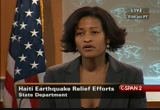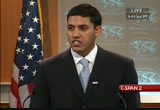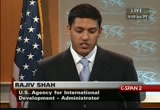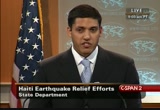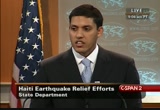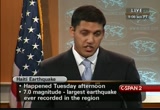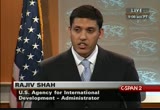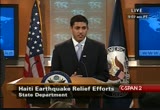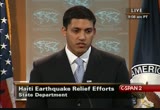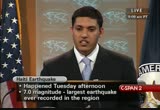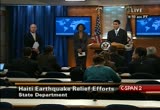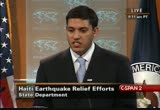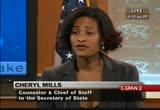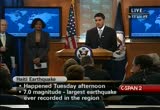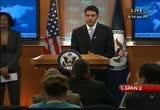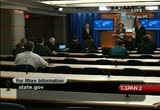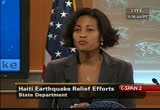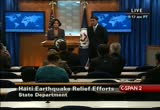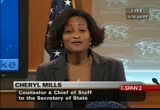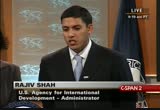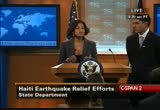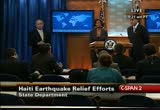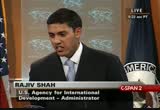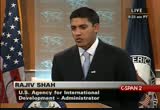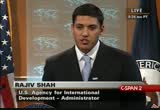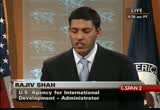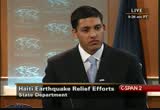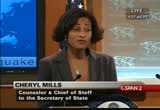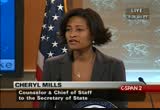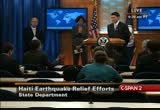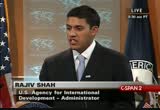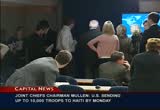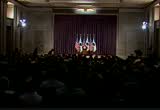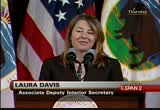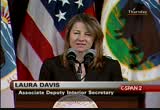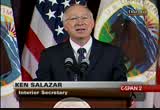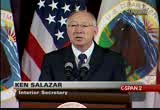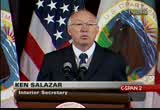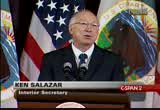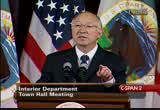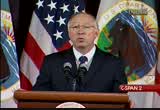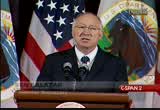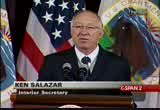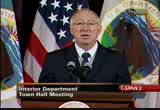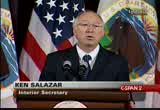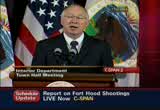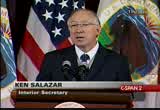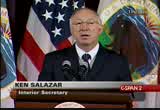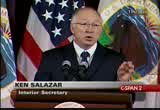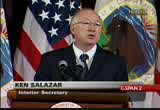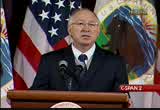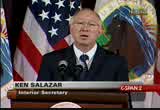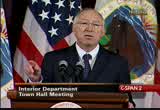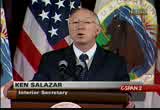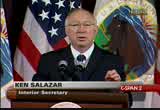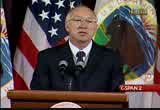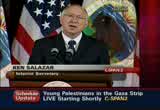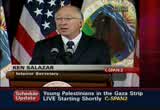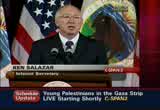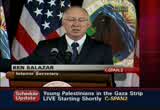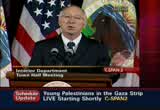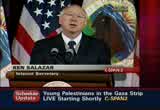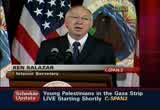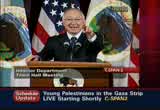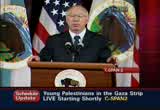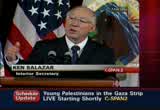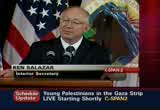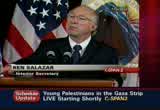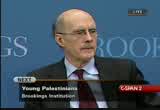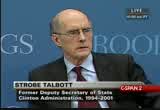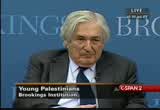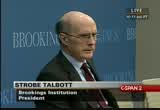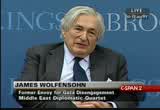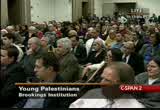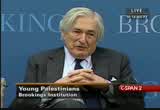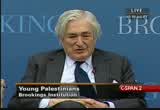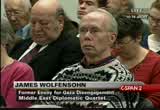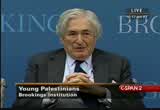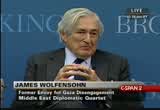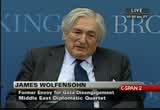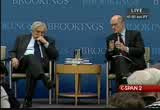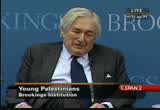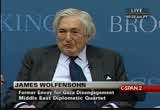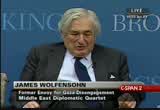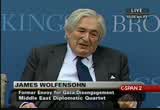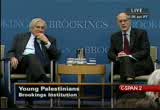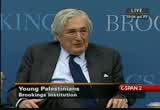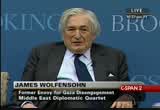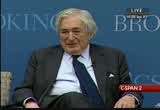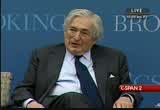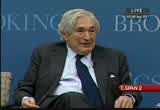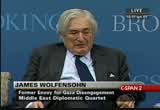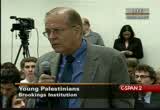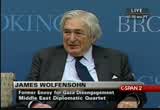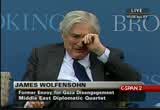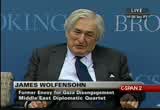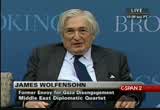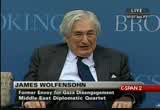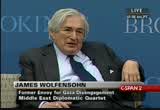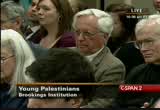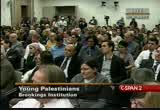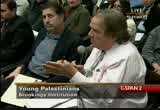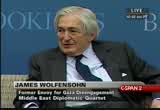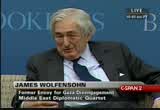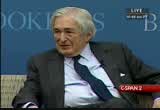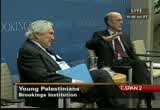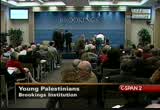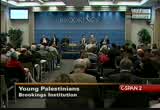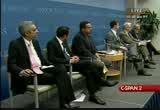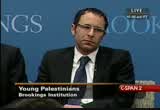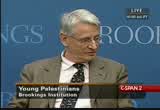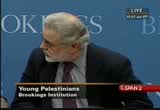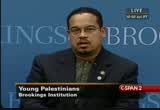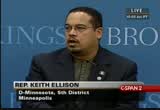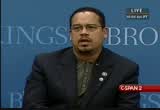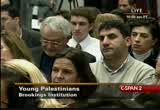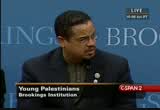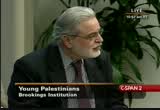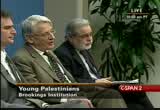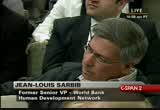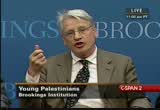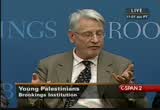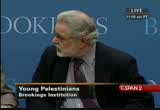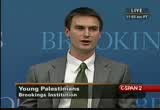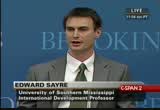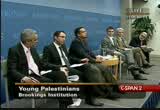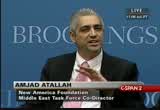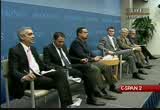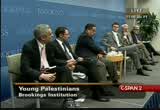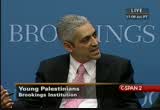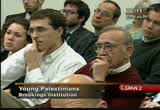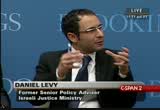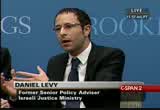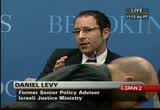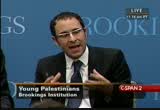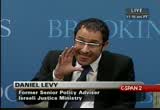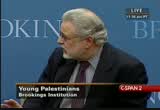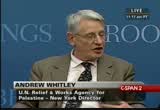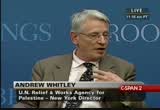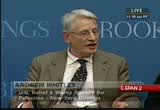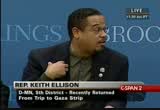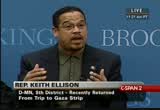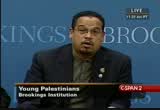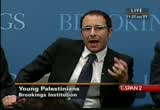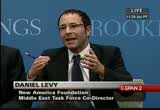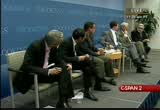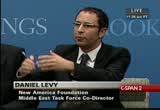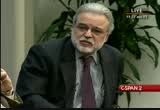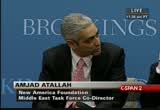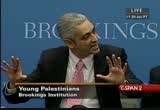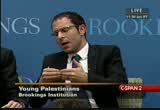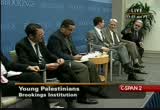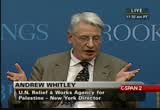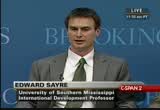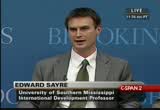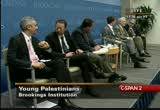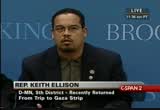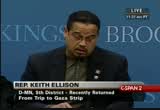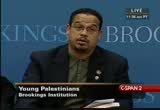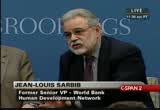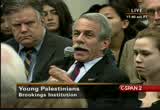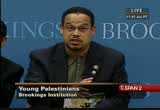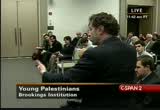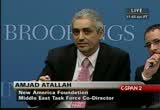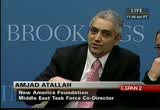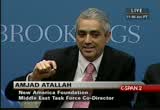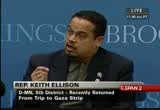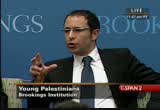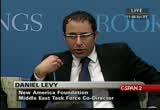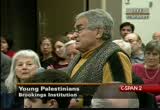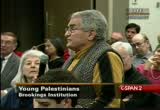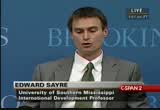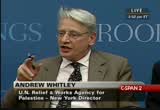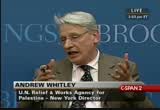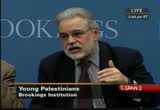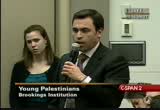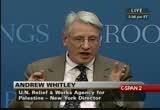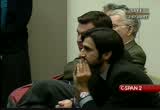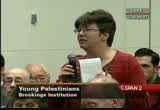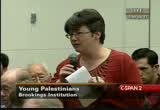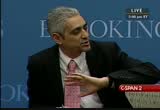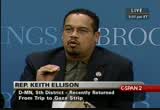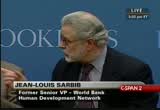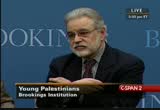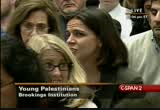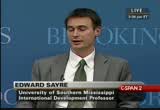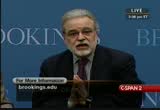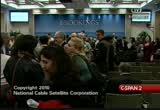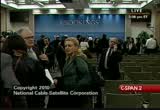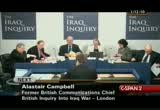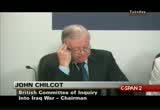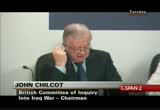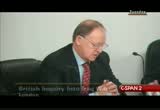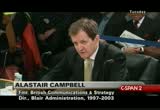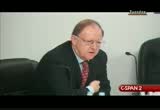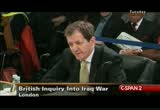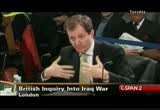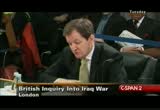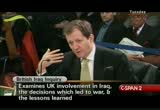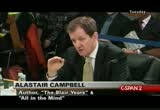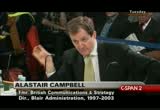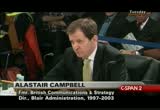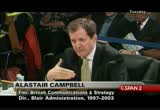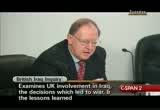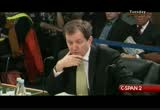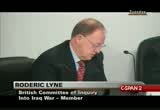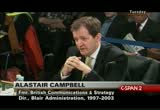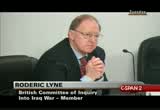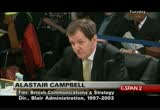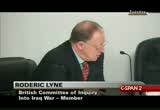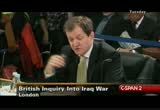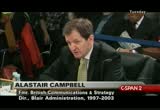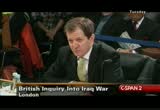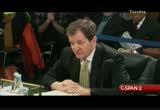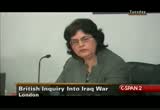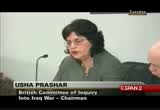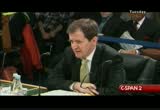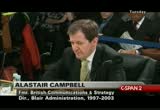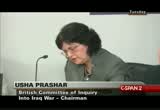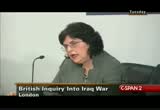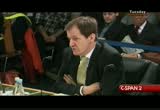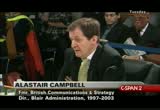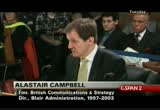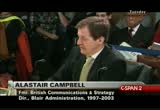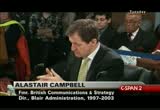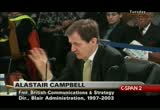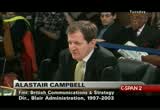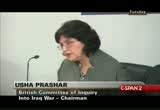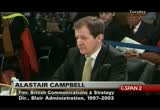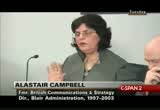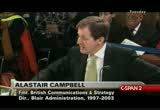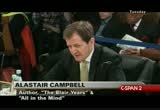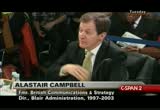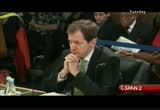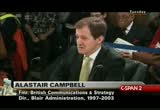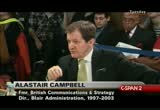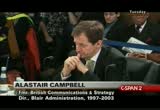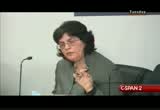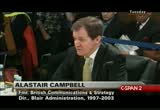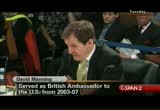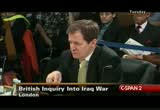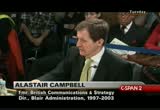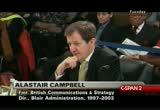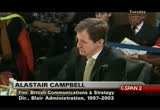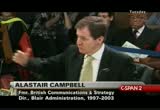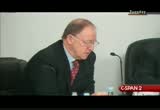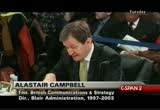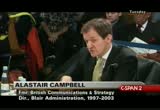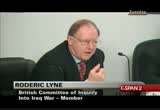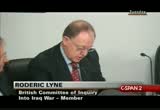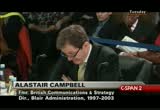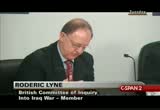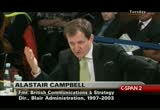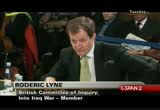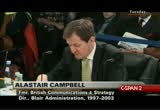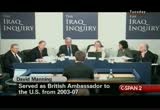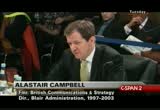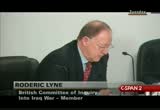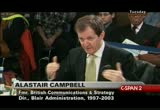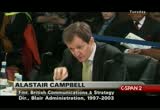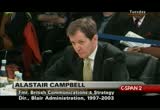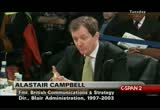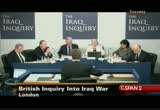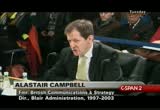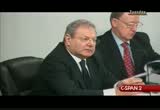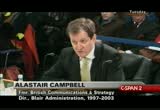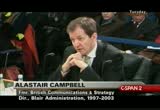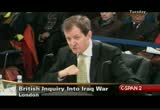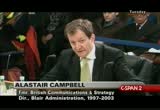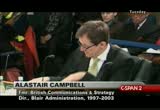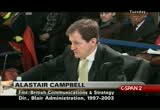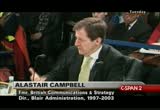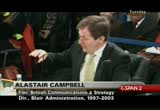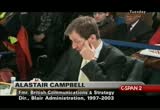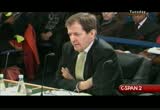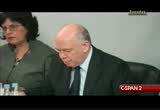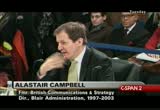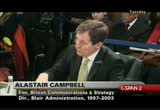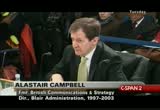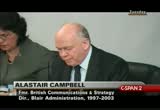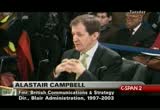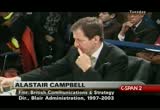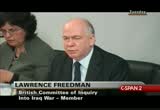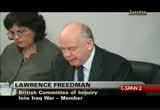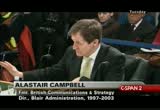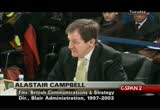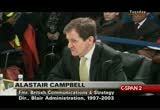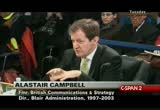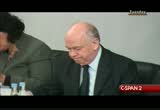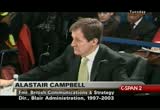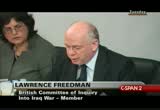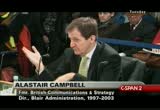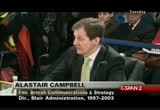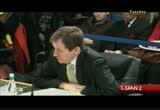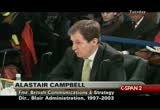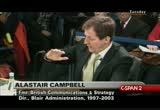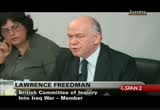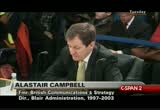tv U.S. Senate CSPAN January 15, 2010 12:00pm-5:00pm EST
12:00 pm
that portal has raised more than $9 million today. for the red cross. we are hopeful that money will be put to great use on behalf of the haitian people. we want to thank everybody who is already making those commitment and encourage others to do so because it provides the maximum addressability for the needs that haitians have on the ground right now. so to speak for the buck that i'm going to turn to my colleague, ambassador shocker hello. i want to provide an update building on the points just raise of course, the conversations that president had with president preval is a clear demonstration of the partnership that we have at that level, and at all levels. many of our disaster assistance response leaders on the ground have had continual contact with different ministries in the haitian government, with different levels of government there. and with their united nations colleagues so we pursue our work in a swift and aggressive and coordinated manner. i wanted to provide an update on
12:01 pm
the leadership of our work in haiti on our search and rescue efforts. and then introduce the major components of our relief operation. are response team led by tim callahan is in the process of doubling in size. we are bolstering its capabilities to use satellite imagery and improve its planning capacities to make sure it has the resources and capacities to really help these strategic and targeted about putting assets and putting commodities in the hands of the nonprofit organizations and other types of entities on the ground that can deliver those services to people and we can map that in an effective way and make sure we're covering the affected areas in a broad and effective manner. our urban search and rescue teams, there are now 24 total teams on the ground actively engaged in search and risky. most of these teams have between 70 and 80 individuals and are fully equipped. four of those teams are from the united states. of course, our fairfax,
12:02 pm
virginia, team was the first one on the ground and has been actively providing service support and leadership to make sure this effort is coordinated and effective. we continue to send additional capabilities and will continue to send teams, but i believe it is now that there is a significant urban search and rescue effort underway. it is still attempting to save lives that they're still an important open window of time today, tonight, and perhaps even parts of tomorrow when we have the ability to save lives. haitian lives, american lives and the lives of partner government people that are there on the ground. we are also mounting today a major relief operation. this of course has been in planning and works since the beginning of this crisis. the united states is mounting this operation in close coronation between the fema, usaid, a number of other agencies, civilian agencies, and the department of defense that as the president noted yesterday
12:03 pm
now has the aircraft carrier, the vinson there. and that will dramatically improve our capabilities to provide critically needed commodities and service support to the ngo partners and two other partners and directly to the haitian public as necessary. there are a few important printable's in this relief operation that i wanted to highlight. our first and foremost goal is to meet basic needs. food, water, shelter, blankets, tarps, those are the types of things that we are focused on meeting in a sustainable and effective way. second, as with our urban search and rich operation, we want this operation tbd the coordinator. both across southern and military aspects of the united states and even more important, across all of the different relief efforts that are taking place with other countries and other organizations. so we've been engaged in staying connected with those partners. third, we want is to be the groundwork for a sustainable developed -- redevelopment of haiti and of port-au-prince as
12:04 pm
the counselor has mentioned. we've had a long-standing and important relationship with haiti, with significant financial flows and significant partnerships to improve the development and health outcomes for the population. so we want to do things now to lay the groundwork for being effective in the area in the future. and forth, we really do want people thinking out of the box. in this next few days, we are confident that we'll be able able to provide the traditional channels of distribution, the ngo partners and the other humanitarian relief partners with enough commodities and support to saturate their basic distribution capacities, given the limited capacities that so many partners have in this current context. we are working with those partners, and trying to ask and we want to thank so many of them for really being creative in thinking about how they might do things differently to expand their reach and expand their
12:05 pm
ability to reach an effective population. that will continue to be very important to make sure we have the broadest reach possible. i like to run through a few quick numbers to provide a sense of scale. on food, we are all ready have mobilized and have on route 600,000 humanitarian daily rations. these will be provided via the aircraft carrier as the mechanism of entry. in addition, we are mobilizing $48 million worth of food assistance. this will be enough food assistance to provide several months of food for the affected population of 2 million individuals. and in addition to that, we are continuing to work with the world food program and a range of other programs to mobilize even greater commodities of food and items of food and different capacities to improve local milling efforts and other efforts to make sure that haiti has the food it needs now and into the near future. on water, we are in the process of mobilizing 100,000, 10-liter
12:06 pm
containers, collapsible containers so that people can access the possible water and we can prevent some of the challenges that will occur if that is limited, especially in the area of public health. we believe 20000 of those will arrive today as part of the initial list of commodities that is on its way. we have four major water purification systems identified, plus the water purification and production capacity of the military assets, the ships, that will be there. so we are confident we will be able to improve the situation in terms of access to possible water. we have six more that have been identified and other storage and warehouse facilities that u.s. aig managers around the world. and where mobilizing those to be able to enter haiti as soon as possible. finally, we are working aggressively on a range of other categories like shelter, blankets and tarps, and working with our partners on the ground to get by how those can best be deployed. we are confident we will have
12:07 pm
the ability to send significant commodities, significant materials and significant supplies. we are working with our partners to identify the very best ways to make sure they are distributed to the affected population. thank you. >> i'd like to ask ambassador shah about some of those figures you just provided. it sounds like this is what you intend to do a story today in terms of actual delivering water and food and so forth. has nothing been deliberately up to this point? and why not buy the usb? we've always had delivery of commodities from the very beginning. this is a different scale of that. our initial -- we had limited capacity to send things into haiti, and we made our immediate priorities saving lives. so urban search and rescue and the operation to save lives was part of that emea ever. now we have military transport logistic capabilities. we have support and cooperation and partnership at the airport, and a number of other transport
12:08 pm
routes that we are working on that will expand the capacity to send more. so this has been underway. the minute this happen, all of these things began to be mobilized at the reason we can start to have things there is we did not hesitate one moment in willie unloading, you know, the vast majority of our stocks and assets to make sure this could get there as soon as possible. >> is the u.s. military mainly distribute these materials or is it going to the ngo's? >> well, distribution -- transport and logistics to get there is a combination of civilian charter and military capacities to get those materials there as soon as possible. is really what ever is most effective. in terms of distributing things when we are there, we will first work with partners and ngo's to reach an effective populations, and then pushed into direct delivery and other, a range of other potential solutions, consistent with our partnerships with the un and with other actors on the ground to make
12:09 pm
sure we do that any smart, coordinator way. >> naked bit concrete more, which areas and what are these areas the badly hit areas, how soon will they be getting this release? >> well, i've been away from my desk or about 90 minutes on not sure exactly what folks are getting. tim callahan is our disaster assistance response team leader on the ground, and he's going to get together with the military. people have already been receiving a series of relief items from the united states that this will expand that capacity dramatically, and today people will start receiving many of these items as we get these things into haiti. >> even if you ignore the past 90 minutes, how many patients have received american aid so far? what areas have they been receiving? what have they been receiving? >> well, i would have to come back to you on specifics on that. our immediate priority up until now has been, and it continues to be because we are still in a
12:10 pm
life saving window, the urban search and rescue. we have in addition been coordinating, you know, y'all see the photos of the commodities that are running at the airport. we have been disturbing that to ngo partners who are reaching people. >> i think the other point is you're asking for, tim callahan will be briefing today with ambassador at 2:00 so they anticipate answering those questions. >> that's 2:00 our time. >> i am with am with the abc news that just a quick question. for the administrator on the search and rescue efforts. can you tell us how many actual haitians, local haitians has been wretched? there's been some criticism on the ground among locals that the search and rescue a arforeigners, the wealthy, that kind of thing. been a question for michelle fmi on what the secretary has been good if you can update us on that sicu been back. >> wheat from the very moment we
12:11 pm
sent the first team in, said that team and with the direct guidance to reach haitians. and to make saving haitian lives a priority, along with saving lives up u.s. citizens and looking at the un complex to try to save the people who could help coordinate and lead this effort going forward. i don't have a specific number's on the number of patients that have been saved. i do know there were 24 teams working -- this is very, very hard worker we were tracking the first team when it worked overnight to save one life, and it was a tremendous achievement that they spent six, seven hours going through the rubble and getting, cutting through layers of concrete, sending in water by line and other supplies to help support the gentleman that was saved. and so it is long, hard worker i don't want to create high expectations that these teams can go out there and be wildly
12:12 pm
successful very rapidly. these people are taking tremendous risks. this is very difficult work. they work around the clock. but the situation they're in is really tragic, and it's very, very difficult. >> secretary clinton cut her trip ashore. he has been spending a lot of her time on the phone with other foreign ministers speaking about the quick lead for the kind of coordination that we would actually like to have an intern that the kind of leadership that the un would actually provide is supported there. she has also been expressing her desire, both here and in meetings that have been with the president to ensure we have the kind of support and commitment that is necessary with this type of effort. she's been doing a fair amount and anticipates doing on the forms, working the phones as well as providing support our whole of government effort as we go forward. >> doctor shaw, you say there is
12:13 pm
his open window to save lives. do you have any idea, given that you have the satellite imagery and stuff, you know, how many people are still kind of a live down there, they can be rescued? i'm not saying you'll be able to save them all, but what kind of dumb as are we looking at in terms of actually possibly could be rescued? and then cheryl, there's some talk by president -- former president rst to want to return to haiti. he says he feels horrible and he wants to go back with his wife and is ready to take some supplies. given the fact he was such a divisive figure in the country, forget about the burden that it would take, you know, security wise to handle such a visit, what is the u.s. position on this, and how they sent out signals to secretary clinton or any other fishes in the building to president aristide that now is or is not the time to go back to haiti? thanks. >> i would just i don't think
12:14 pm
it's appropriate to try to guess or target how many lies could be saved. we have hundreds, you do, probably more than 300 american professionals with equipment and with capacities to do this work, working around-the-clock in difficult and dangerous environments, putting themselves at risk to really give this effort full effort. we also have all of the other teams that constitute 24 total teams. so i respect their commitment and their full effort to save lives, but we don't -- >> how many people do you think that are still alive gunnar? >> that's very hard to try to address. >> we've been focused on trying to make sure our target is how we can provide support necessary and assistance necessary for the relief and rescue. we appreciate. we have not focused on them as much as we focus on the need to ensure that we are providing a level of support and commitment that is necessary for the haitian people at this time.
12:15 pm
we are aware of that and will be taking stock of that, and if there is something more than what have i will make sure to get back with you. >> this question is for cheryl. there is a perception kind that the u.s. is going back into haiti again as going to be there for some very long time. but at the same time in recent years there's a lot of talk that brazil and a lot of latin american countries bring a lot more to haiti than it used to. my question is going forward, how is the obama administration going to make sure that we are not seen as a recolonize and the place, considering how much devastation there has been there. and also are you looking at haiti as kind of a potential model for how the obama administration works with latin american countries, given the president's kind of outreach in his attempt to redefine that relationship? >> i thought only the lawyers asked that many multipart questions that let me try to stick to that. the united states commitment to haiti has been a long one and has been one of the countries
12:16 pm
that over many years we've had a substantial amount of development, eight and commitment. we have been providing tremendous financial support to that. as well as larger scale development support for haiti. our commitment in the hemisphere to haiti is a very long established one and we anticipate that being to continuing. so i don't think there's something new about our efforts in this regard. in terms of the construct about how we would do this. we been doing this in partnership with the haitian government. i forthrightly with president preval. i've had the pleasure of working with his ministers as well. we been able to do that any effective partnership. it has been in haiti for the last 9012 months, it's been a great window to be able to try and accomplish any number of different things and his government has been committed to be providing the leadership in that regard. and enable a flash of there was a donor conference for all of the different countries came together and said we want to do this in partnership with haiti,
12:17 pm
and haiti has a plain. i think that spirit is the spirit in which people are arriving today. they are not looking in any way to be anything other than a partner to haiti integer haiti's long-term stability and success for the haitian people, for the haitian government because they are entitled to there. and we know in order to do that well, we can only do that in partnership. we cannot do that by taking over. we have no intentions of doing so. >> i wanted to follow-up on his question. i mean, you don't want to be anything other than a partner, but that fact though you may be running the show when you get on the ground that even the government set up is being destroyed. can you give us concrete details how you're working with patients? >> two things to think about. i doubt that within the last two days they have drafted a plan for haiti because i think that might be more than we could do your but i do think a couple of
12:18 pm
things. the haitians have been very clear with us with their leadership. one of the first things prime minister jean-max bellerive laid out and president preval reiterated on the first day of the crisis was what their priorities were. their ambassador did the same thing. their priorities were rescued, assistance, medical supply, communication and help with the energy sector. we have helped with those regard that as a secondary matter, they are also very clear and those of you that have had the pleasure of being in the presence of president preval know that he is the leader of his country and you have the pleasure of no and that he is confident in that leadership, as are his ministers. i think part of the challenges that are being face right now are quite challenging because no fumigation struck and a lot of other structures are not present. that doesn't mean they are not communicate with our ambassador. they are quite clear about what their needs and goals are. they have been clear about
12:19 pm
welcoming in being grateful for the partnership that we provided and a partnership that the entire international community has been providing, including many of the latin american countries and others. we are respectful of that. >> could i just offer one example. because you raised health. our usaid erector visited with and met with the health minister in haiti. coming out of that, the health minister requested that we help them begin the process of developing a hospital network in port-au-prince. so as we came back and thought about how could we respond to their request, we identified resource at the department of health and human services, and are sending in a number of disaster and medical emergency teams, assistant teams. those teams will be placed in the physical sites where the health ministry would like to begin to develop infrastructure for a longer-term and more sustainable health services provision sector. that's just one example. that is the way we hope to work in partnership and in
12:20 pm
responsiveness to requests from the haitian government. >> i wanted to follow-up, you say the health ministers seem to working. are there other ministries that are working? also, the police seem to not be showing up for work that does the 82nd airborne have authority to a rest, to detain people, what sort of authorities do they have from the haitian government? >> i think one thing just remember, when you're speaking of police, they have suffered a tremendous trauma did so. they have no doubt lost families and others. just as any of us would be searching for our families, they are doing that. i think that is something that is completely human. i also think it's important to remember that muniz has a long present that they have a long present in haiti and is a part of that team, they are a large police force that is part of that security force her to have been present. they are providing leadership in that respect and we are
12:21 pm
anticipating they will continue to provide that leadership with respect to the security of haiti. our folks are there. all of our folks, military and civilian are there for humanitarian and disaster assistance relief operation. that's what they're doing and that's what they will continue to do. >> given your express with previous disasters, how long would you expect the military to be there? going forward with this longer-term commitment, are you envisioning a scale of u.s. civilian helpers, a idea and others, sort of a civilian surge? >> well, let me address both those. the first one, certainly as we do the planning, the planning is all guided by what are the assets and capacities that haiti needs to have as capacity there. so that these military assets can be withdrawn. for example, including the water support, the goal is to consider how much water, how much potable
12:22 pm
water would we need by the ships that are down there. what can it do to help stabilize the situation in the coming days and weeks. but what can we do in parallel to that to help build strong local capacity so that that's not necessary anymore. the goal very much for every sector where we are developing a strategic approach is around how do you help build the local capacity with the great local nonprofit organizations, and under the leadership of the haitian government, to make sure that these emergency ascent can go back. but i think it's important to recognize that this is an immediate emergency. and i think at today's 2:00 briefing, tim callahan will be able to describe the extent to which there are significant, immediate needs. and so is our responsibility and the president has directed us to be very responsive to meeting those needs in any way possible
12:23 pm
in this immediate timeframe. >> would this be a period of weeks or a period of months? the severe needs that they have are independent of the earthquake. once you start building water systems and trying to ensure healthy living is the one you have a crisis on your hands that is ongoing. how long will this last? >> right now, this is a crisis operation. it is a disaster relief operation. so we will be assessing that carefully to our priority is to build that local capacity so that all of these crisis and disaster assets can essentially be withdrawn. and development professionals at a id and other parts of government are very focused on how do we do things that build a sustainable capacity. that's the key phrase we use in our planning and thinking. but with the caveat that we are under direct orders and we intend to provide direct relief, because this is an emergency situation. >> when you talk about building local capacity, are you talking about training and that t of
12:24 pm
stuff for the haitian people? because i'm not really sure about the plan you had before. when you rebuild to have to teach people to implement what you are putting on the grand. >> i think -- i would respectfully suggest that that concept is perhaps not as applicable to haiti. haiti has a very resilient and very capable population. i will give you one example. there are milling equipment, they can take weeks and they can know it and they can use their local food systems to distribute food and to meet needs. and our partners can work to buy that food locally. that's not going to happen right away but we are already planning for that. the goal is not to have long-term food aid to the goal is to be an immediate emergency response so that people can eat and two, at the same time, lay the groundwork for a sustainable agriculture and food systems so that -- that's what's most
12:25 pm
important over the long run. >> the image of the u.s. military around the world is obviously of warriors in a lot of cases, but when you have a disaster of this magnitude, it seems like u.s. military is asked to play a vital role in saving lives, and rushing assistance to people in the. i wonder if you take a moment to talk about what the military is bringing to this operation, and what it means to the whole operation? >> well, the military has been very much a part of this operation from the moment that we stood up our emergency team is working across the federal government. they bring a full range of assets and capabilities, including ranging from the satellite imagery that i discussed, earlier that we hope will help inform the capacity of our disaster assistance team, to do things in a strategic and well considered manner. to the transport and logistics as providing, they got many of our urban search and risky teams on the ground. managing and supporting the
12:26 pm
operations of the airport so that that can be efficient. and as possible in a safe manner, providing transport and logistic support for much of this relief operation. so it is a significant set of capabilities. not to mention just the partnership with d.o.d. leadership, and considering what are the best strategies to meet immediate needs and to do that anyway where we are clear about making sure we have -- we're investing in those things that will allow us to leave overtime to. >> are you saying that the u.s. military's role, you are ruling out it would be -- are you leaving that door open? >> can i address that? i think two things that i think as a practical matter what we're focused on is the assistance and relief. we will look to the un for whatever support is appropriate and will provide that support consistent with the leadership they are providing on the
12:27 pm
ground. our goal and our immediate mission is to provide actual disaster relief and relief and that is what we are providing. >> are you ruling out that the future days and weeks ahead that the u.s. military could play a security will? >> i think really in or out anything beyond the disaster relief would be premature because we have no assessment. while we do know is that what our expectations for our team is disaster relief. we have a very strong security component on the ground in the un team that's already there. they have played a very strong leadership role, very effectively. in haiti led by a very effective commander. we are anticipating to continue to provide leadership and play that role. we're not anticipating that's a row we have to provide. we are committed to providing whatever support is necessary for the haitian people. >> i want to follow on that. in a general sense. because everyone has seen the pictures of some looting, some
12:28 pm
people running around the streets with machetes, giving a sense of some disruption of the security situation. so that if the un is playing that role, it's obviously not totally effective everywhere there. i'm not sure it ever was, but it doesn't seem to be now. i just want a sense of how worried you are about the security situation, and how worried you are about it getting out of control. >> i would take sensitive to the fact that the statement that the un had not done anything to job in providing security and stability in haiti, i think that is one of the things they have done quite well so i would just like to be transparent about both the governments, our governments expense of that and i'm my own observations with respect to the role they have played that i've not had the opportunity to see some of the images you are speaking of that item confident images will always be there in a moment like
12:29 pm
this. i do believe that is something that the un team there is providing and we are committed to providing them with whatever support is necessary to ensure they can continue to play that role. >> security aside, i was wondering if you talk about how you're coordinating the effort, and what is the structure that you envision for the future assistance plan? will this all go to un agencies will they take the lead and decide what's going on or will there be a parallel structure with the united states. how are you going to balance the civilian and non-u.s. decision-making process with that when you got this machine that exist to go out and do that? >> there are multiple points of ordination to the first and most important one was the way to record it with the government of haiti. as you've seen from the events of just the recent day, that coordination happens at every level. and is deep and will continue and we're very committed to that.
12:30 pm
as i suggested with the example in the health sector, we want to work in that manner. second is the coordination of the disaster relief effort, which includes all of the different countries in the great generosity of its home in organizations. that coordination went to zip it will be led by the un. we will work in close cooperation with them to make sure that they have the capacity and the support to do that effectively. on the military side, as we addressed, we work in cooperation and in support of. the un and its capacities that have been present there that have been there for a long time and have relationships and have those leadership roles, we intend to slide into those under those rules and to work effectively with the un and the government of haiti. >> what's the connection with the haitian police, there's a new police organization that would help set up?
12:31 pm
12:32 pm
is it toward the relief efforts. that and more at cspan.org. minnesota democratic representative, keith ellison, one of only two muslims in congress, traveled to the gaza recently. we can see that live from the brookings institution at 1:00 eastern on c-span2. until then, interior secretary ken salazar held a town hall meeting for employees. we'll show you as much about this hour-long event we can. >> it is really great to see you of you here, it is a full house. this is really wonderful occasion for us as we gather
12:33 pm
to talk about the work interior has done in the last year the agenda that president obama and secretary salazar have for the year ahead. having had privilege of coming here with the secretary on day one of year, i can tell you that, i'm amazed at what the secretary has accomplished in a short 12 months. he has an incredible work ethic, and a passion for all of the issues that matter to of us. i remember on that very first he told us that he would work for more proactive and balanced stewardship to protect our national parks and open spaces, restore our nation's rivers, resolve our water supply challenges, and, address the challenges faced by our native-american communities. is he true to his word or what? [applause]
12:34 pm
he also told us our department, the department of america, would be lead leading the way and changing the world for the better. under his guidance, and very gentle prodding we're doing just that. it is an inspiration for me to walk in here every day and work with all of you on the issues that are so important to all americans, and it is an inspiration and honor every day to work for secretary salazar and serve the president. thank you, mr. secretary, for the opportunity to be here with you. [applause] >> thank you, laura. thank you, laura. you know, we've had a great 2009, and we're fired up and
12:35 pm
we're ready to go for 2010. i'm fired up. are you? come on !. [applause] our work truly has just begun, but i want to say just at the outset it would not have all been possible to do the great things that we did in 2009 had it not been for the 70,000 men and women who make up the department of the interior. many of you know that last week there was some scuttlebutt in the media i would leave to go be governor of the state of colorado or run for that position. i said no, because i wanted to be right here with you because this is -- [applause] this department, as, the cus towed yawn of america's natural resources and as custodian of america's history does so much for 300 million americans that i am just very proud to be at the
12:36 pm
helm. i want to thank everyone who is here and everyone watching us around the country. before i begin i want briefly recognize everyone in the department, particularly those people who are with the united states geological survey, who have been helping respond to the tragic earthquake in haiti. our thoughts and our prayers are with them today and the people of haiti and, we will do everything we can to support the administration's rescue efforts as that country struggles with a natural catastrophe that has hit it. today, looking out all of you, i want you to know that i am very proud to serve as your secretary. at this moment, in history, and with this president and with the agenda that we have developed together, i would rather be secretary of the interior than doing anything
12:37 pm
else professionally anywhere in the world. almost one year ago, nearly two million americans gathered together here in the national mall in washington, d.c. you remember that day. it was cold and, there were tremendous crowds. it was a time to witness a swearing in of a new president, barack obama. who believed then and who believes now and, as we have always believed in our ability as a people to rise to the test that we confront. to change what must be changed, and to work together as a people to form a more perfect union. the belief that we can leave our world better than we found it is why we here are all called to public service. it is why all of us are here at interior. i know this, because, i have traveled many miles over the last year and, met many of
12:38 pm
you across this country. in albuquerque and the apostle islands and buildings in bismarck and pelican island, and in palm springs and although i have not met everyone of you in this department in person, i do hear from you and i know you hear from me. i know you get my e-mails, and i appreciate those of you who respond to my e-mails. every day i hear incredible stories of interior's public servants who go above and beyond to help deliver change. they are employees like kim dryden fish and wildlife service biologist, for 13 years has poured herself and her heart into the tore rick picayune strand restoration project in southwest florida and everglades. her hard work has paid off. last thursday assistant
12:39 pm
secretary and chief of staff, tom strickland, he joined sam hamilton with her to break ground on the 55,000 acre restoration project, a cornerstone of our efforts to restore the river of, the everglades here in america. let's hear it for kim and let's hear it for all -- [applause] not only for kim, because that round of applause goes to all the scientists who work with on the department of interior, thank you for recognizing her. we have had many stars at interior this year, including all of you who have been working with chris henderson and bureau directors and all of the rest of our employees in the implementation of the recovery act. that is a major responsibility and we need to make sure that it is implemented in the right way,
12:40 pm
based on the directives that we have from president obama and our responsibility is to make sure we're taking care of the $3 billion that were brought to this department through the recovery act. the people who have worked on this effort are many throughout the department. they are people like fay winters with the bureau of land management in florida. fay is the project manager of four recovery act projects at the juniper inlet lighthouse outstanding natural area. like many around the department, fay assumed her recovery act responsibilities on top of doing everything else she is doing. she knows people are counting on her to get projects underway and people can get to work and bring home a paycheck. she knows she is working on projects that will have long-term sustainability effect on the blm area she works. fay has done a great job and her work made for an tra order dare any --
12:41 pm
extraordinary 150th anniversary for juniper inlet lighthouse last week. let's hear it for fay and everyone working on the recovery act. [applause] we also have many other people who work heroically throughout this department all the time. when the record floods hit the today coats last spring, it was interior employees from the fish and wildlife service and other agencies and people like duane krustad and mike morole of reclamation. they were all on the spot. for example, duane and mike worked on the on site area at jamestown dam. they were there for 40 days straight, 40 days straight, without rest. 40 days straight without rest. it was the two of them and their team that saved countless lives and, and we
12:42 pm
are grateful to them. let's give them a round of applause. [applause] and when those horrific fires hit california last year and it seemed like all of california was abraise, it was people like sue cannon, usgs landslide scientist who was there to help. sue and her team were on the ground for nine major fires, delivering the critical assessments and information on debris flow hazards to help the emergency managers, land managers and weather service plan and react and recover. kim, fay, sue, duane, mike and countless others thank you for doing your work and being proud of the work that you do. thank you for delivering for the american people. give them another round of applause us. [applause] we do work, as i often say
12:43 pm
from sea to shining sea and all over this planet. it is in places like american samoa where we are making a difference. where the office of insular affairs and tony is helping with the tsunami recovery efforts. in haiti where the usgs scientists continue to supply the critical data on that earthquake there. right here in washington see with the remarkable service of our united states parks police. they are all my heroes. they are servants ever the people. they are servants of the american people. and i am very proud of them. so, let's hope that they all, and pray that they all stay safe. that they are doing what they have to do and, just very appreciate them. so let me talk a little bit about tear i don't remember in 2009. 2009 was a tremendous year. it was a tremendous year of accomplishment for all of us. it was also a year of great challenge on both personal
12:44 pm
and professional fronts. the recession has been a very difficult recession for this country. it is a recession that has a deep and personal effect the people of this country including many people who work here at interior. some of employees spouses lost their jobs. two incomes in some families shrank from two incomes to one. college tuition, house payments, and retirement may all be looking more different for many of the families here at interior. as fathers, mothers, sons and daughters, must tend to the of family first, and i hope that your career at tear i don't remember is a source of strength and security for your families. but our jobs of course are far more than a paycheck earned or the hours that we work. for it is at times when our nation is tested that we feel the greatest urge to
12:45 pm
help others. it is in these moments when our service feels more rewarding. president obama is counting on each of us, and even more importantly the people are, of america are counting on each of us to give our best, and the agenda that the president and i have outlined for interior gives each a role to play in the american recovery and american renewal. with the president's leadership and with the terrific team we now have in place, we are pulling the oors together and steering our nation out of storm we've been in. in just one year we are moving as one department of interior, as one family until a new correction -- direction. i have assemble ad report that summarizes our first year of work under the obama administration. the report is being circulated and sent around to all of you by e-mail. it does not include every milestone or every achievement over the last year, but it hits on lights
12:46 pm
for our department. in my work as your secretary see the department as cus toweddian of our natural resources and custodian of america's history. that report you can find as you the auditorium or go on line at doi.gov. i hope you will all spend a few minutes reading through it. the report is organized into six areas which we focused on the last year. first, fighting to protect places that americans love. second, building a clean energy economy and tackling the impacts climate change. third, working to do right by indian nations and supporting the island communities. fourth, connecting our young people with the outdoors so they too can fall in love with our land and our water and our wildlife. fifth, finding consensus and solutions to water challenges that vex our country from many places around the nation. and finally, changing how we
12:47 pm
at interior do business, how we strengthen ethics standards and improve our service to the american people. we are making progress in each of these areas. soon after being sworn in, president obama signed sweeping concentration legislation protecting america's great outdoors. it is important to pause just for a second and for us here at interior to recognize that in that act, it was one of the first major bills signed by president obama into law. with a stroke of a pen, the president on that day, in the white house, in front of the national conservation leadership and the leadership of the congress, created two million acres of wilderness. added more than 1,000 miles to the national wild and scenic river system and authorized three national parks, four new national conservation areas, one new national mon you and created
12:48 pm
into law the national lan landscape conservation system for bureau of land management which covers over 25 million acres. that legislation was a terrific start for president obama and for the conservation legacy which we want to build here at interior and for this country to build on that legislation, which the president signed we have taken the billion that -- $3 billion that came to us through the recovery act and we invested into america's landscapes. we reopened the of the statue of liberty. we've broken ground on flight 9 as a memorial to heroes on that flight. and we made great strides in restoring everglades and moving forward with new momentum of restoration of the chesapeake, on the great lakes and other treasured landscapes all across the country. i'm proud we have restored the role of science in decision-making. that section 7 consultations
12:49 pm
are back in the way that they should have been. and so too are the brown pelican, which is back in the kind, numbers that it should be and we have declared it to be recovered. the polar bear has a proposed critical habitat which it did not have before. 200,000 square miles of critical habitat in alaska. we laid out a plan to restore the health of wild horse herds and their ranges. we have built the department of interior's first ever coordinated strategy for confronting impacts of climate change on america's resource thanks in large measure sure to deputy secretary david jesus leadership in that area. we have been to rewrite the mining rules to better protect appalachian streams an communities the we engaged as a full partner with the state of california and tackle the drought and enormous complex water crisis they are experiencing.
12:50 pm
on the colorado river, we have established a new protocol for water flows into the grand canyon and, through that national park. there is a lot that we have done. but we must do more and we will do more in 2010. i'm also proud that in 2009 we made progress in our efforts to honor the federal government's commitment and responsibility to the indian nations. in november the president of the united states was here at the place, hosting a white house tribal nations with more than 400 lead of the federally recognized tribes in america. we today are working with the department of justice to strengthen law enforcement in indian country. and with the department of education, to improve the 183 schools that serve the 44,000 children over which we have responsibility to provide an education. and after 13 long years, of
12:51 pm
litigation, that strangled this department, we have reached ament of the kobel litigation when nobody thought we could do it. [applause] and on the energy front we have been hard at work to change how we do business and build a comprehensive energy plan for the country. in the last year we have offered, yes, new areas for oil and gas development and but we also instituted reforms to insure we are offering leases in the right places and in the right way. importantly, we also have opened up a new energy frontier on america' lands and oceans that will help power our clean energy economy into the future. for the first time ever environmentally responsible renewable energy development is a priority for this department. long-awaited offshore renewable energy rules are
12:52 pm
now in place. with other federal agencies we have cleared out the red tape on renewable energy and transmission siting. we have mapped out over 1,000 square miles of land in the southwest for solar energy development. and we are fast-tracking solar and wind projects that can get up and running quickly. we expect that of the solar and wind projects currently proposed, that more than 5300 megawatts of new capacity could be ready for construction by the end of 2010. that is enough power for almost 1.6 million homes, and that project construction will create almost 50,000 jobs. let me pause for a, and just put a punctuation.on what we point on what we're attempting to do there. the department of interior taking the lead role will be
12:53 pm
in position by december of this year, 2010, we will have permitted facilities that will have a capacity in generating in excess of 5,000 megawatts of power. a typical coal-fired power plant will produce about 350 megawatts of power. therefore 5,000 megawatts will be equivalent of more than 15 coal-fired power plants. and i'm proud to say that it is the department of interior, the bureau of land management and the fish and wildlife service who are at the point of the spear bringing about this renewable energy revolution to america. we should be proud of what the men and women of this department are doing. give them a round of ap. [applause] -- applause. >> some people have to see things before they can believe them. some people say that, when
12:54 pm
we try to capture the power of the sun or the power of the wind or the power of the earth through geothermal energy that it can't be done. people have been talking about this forever through the 1970s when president nixon announced the, pronounced the words, independence for the first time, and, when president carter stood in front of a nation and said, that we would move forward to energy independence with moral equivalent ever war. and yet, nothing has happened. so what we're doing here, under the leadership of president obama and, the incentives that have been put into place, is we will make believers out of the skeptics. when you can see a solar power plant that will be generating hundreds of megawatts, it will make believers out of people. so we can capture the power of the sun to power our homes and to power our cars.
12:55 pm
and when we capture the power of the wind off the atlantic, you will see how it is that the united states will not be left behind denmark or united kingdom, other places around the world which are moving fast pour ward on that agenda. i'm proud to say that the department of interior is at the point of the spear on that effort. we have accomplished many things in one year. but more work is underway and to get it all done we have restored budgets that had been in decline since 2001. thanks to ria sue and pam hayes and many people in their offices and bureau offices that do the work for the department on our budget year after year, it is a very difficult and very long process. just as a budget takes a great deal of time to develop, we must recognize that each milestone we reached in the last year is a culmination of months and often years of work at all
12:56 pm
levels of this department. we have reason to be proud of each and every milestone but our work in the first year of the obama administration is more than just the sum of the parts. it is about a new approach it is about a practical approach. it is about solving problems for the american people. on interior's issues, there is rarely an easy issue. there is almost never one answer. and that's the way in which it has worked and, that is the reality that we confront every day. that's why we must always be open to new ideas. we must adapt our thinking. we must engage the public, and we must stud and learn and apply the best science at hand. this spirit of pragmatism and respect for science back at all levels of this department. the work of the first year reflects a new way of doing
12:57 pm
business. in a larger sense though, it also reflects a set of values that americans want us to uphold, but, which have too often been forgotten in recent times. as custodians much our nation's natural, cultural and historic resources, we, you and i, a duty to protect the places that americans love and to help all americans connect with their and with their history and with their heritage. and while icons like yellowstone and yosemite are in great hands, many special places beyond our boundaries are quickly disappearing. every year, every year, in 2009, this happened in 2005, when you look back, we americans are losing million acres of land. an area the size of connecticut, as our nation's lands are transformed to development.
12:58 pm
and as a places we we love disappear, so do disappear the connections that we have to the land. they are the places that we americans knew as children, the places we hunt, the places we hike, the places we bike. the places we picnic, as families. the places we unplug and we unwind. today, as many kids get outside as they did 10 years ago. that is half as many kids get outside as they did 10 years ago. 60% of americans do not get the recommended of exercise. and one-third of adults are not physically tiff at all. our job at interior is not merely to wisely manage the public's resources. to insure for example, its solar wind, oil gas development happen in the right places and at the right time on our public lands, but our job is also to help americans reconnect with the places they know,
12:59 pm
and that, fuel our spirit. that is why we are engaging and expanding youth through programs, throughout the department, and it is why we need to reach out to audiences who have never visited their public lands. but to connect people with their lands, we must also tie the american landscape back together. we can no longer imagine a national park as insulated or isolated from the lands around it. we can't imagine a national wildlife refuge in the same way. the reality of it is, we need to think about the ecological systems. we need to recognize climate change and habitat fragmentation, development require us to break old habits and think beyond our usual boundaries. that's why we must seek new partnerships with private landowners, state and low governments and tribes, as we build a landscape scale
1:00 pm
1:01 pm
the birds and the wildlife that go through that ranch and around that ranch. those are the places that i love. we each have those places. and we all care deeply about them. all americans do as well. our challenge is to inspire people to rediscover the lands they love and to engage them in their stewardship and protection. and americans i believe are eager to respond. americans want more trails. they want more parks. they want more open spaces. they want more time to gather as their families. they want more chances to connect up with one another. ralph waldo emerson once said he
1:02 pm
who knows what sweets and virtues are in the ground, the waters, the plants, the heavens and how to come at these enchantments is the rich and royal man. yes, the american renewal is about jobs and a return to economic growth. but it's also about how we refuel our american spirit. it's about remembering the values that we share. and it's about reconnecting with the places and stories that set america apart. i'm excited about the year ahead. because of you and i get to work with you. i know interior as well-suited to lead our country in these times. with your work, with the leadership of president obama and the passion that the people of this department share for what we do, we can change the
1:03 pm
world together. thank you very much. [applause] >> i am told i have time for questions. so i'll be happy to take questions. and i think there are some mics out in the audience. if you have a question, please don't hesitate. >> thank you, mr. secretary, for the opportunity to address you. my name is arthur nelson. i work for the cio currently detail with office of law enforcement and safety. i've been here 11 years. and specifically what i'd like for you to answer with a little
1:04 pm
background -- next month is black history month. notable time. your recent comments in politico is about harry reid and that situation. i applaud you for that. however, i'm curious i've been here 11 years what specifically have you done to -- to promote diversity in this department? and what do you plan to do the next year to do that? >> that's a very appropriate question. you know, the president and i very much share the view that we need to have a government that is an inclusive government and one that is reflective of the face of america. and so within this department, if you will look at the diversity of the hundred or so people that i have hired in the political leadership team, you will find that diversity there.
1:05 pm
if you look what the departments are doing in terms of performance plans, we are including diversity there as a performance factor to make sure that we do move to having a department that is reflective of the face of america. let me say two other things about the importance of that. we will be relevant as a department of the interior if we keep up with the demographic changes that we see in america. and for me, that means that we are reaching out and that we are including all people, bob staten is spending a good deal of time, for example, going out and trying to recruit people from backgrounds where they have not been coming to the department of interior to work. and letting them know the door is open and the opportunity is there. we think about the youth programs that we started in this department. the fact of the matter is that over the next seven years, 40%
1:06 pm
of our work force will change because they will retire. it is a great opportunity for us to recruit and to make sure that we have an inclusive work force and will be a high priority of mine. you know, for me this is an issue which is personal because i recognize where our history as a nation has gone. and i recognize that in moving towards a more perfect union, there was at different times many places for improvement. this morning as i was coming in, i made an unscheduled stop at one of the great places of moving forward with as part of our job here in this department to tell america's story. as a history of the department. at the martin luther king memorial where i signed the permit after 10 years of long delays. where construction is underway
1:07 pm
and 40 people are building a memorial for -- to recognize martin luther king here on the national mall. i spent time with dr. king's older sister, mrs. farris, not only here in washington but also in atlanta where we visited the birth home of dr. king. and so it's an agenda that is important for me.wc] it's an agenda where tom strickland and john jarvis and i often had conversations about how it is important that we tell all of america's story. for sure, it is important that we make sure that we're taking care of the natural wonders which we have responsibility for on behalf of the american people and how we move with a agenda to the landscape scale and we will get that done. but as important as that agenda is, it is equally as important
1:08 pm
an agenda to make sure that as we, the custodians of history, the custodians of telling america's story that we tell all of america's story. and so that includes the stories of the japanese internment camp or the story of our newest national park in california, which essentially tells the story of discrimination against african-american soldiers in world war ii. >> we'll leave this talk at this point to go live now to a discussion on young palestinians especially those living in the gaza strip. nearly three-quarters of those in the palestinian territories are under the age of 29. the brookings institution here in washington is hosting this event. it's jusç getting underway. >> of this institution and has some other credentials that make him just the right person to get us started. on the topic of how to secure the future for palestinian youth. jim and i are going to engage in
1:09 pm
a bit of a dialog for a few minutes up here at the beginning. and then we'll turn it into a multilog involving as many of you as possible. and in about 40 minutes or so we'll turn the program over to an excellent panel that's assembled here. and we thank our friends and colleagues from the new america foundation, which has been helping us put this event together and some subsequent ones still to come. i won't introduce the panel now. i would, however, like to say to congressman ellison, what a pleasure it is to see him back here at brookings. he's been a frequent visitor. i don't think i said to go in length about jim wolfensohn's background. >> good. [laughter] >> well, we'll just stop here. he's come to talk to us about fencing this afternoon, a sport
1:10 pm
from his youth which he's taken up once again in middle age. >> early middle age. >> right. but in addition to being an athlete and an olympian, but he's also been, of course, a global public servant. he was that in his capacity as the president of the world bank and again, in 2005/2006 he was the special envoy for the quartet, working on the middle east in general and the issues and challenges of gaza in particular. subsequent to that, he -- as a brookings trustee has enabled us here at brookings to establish the wolfensohn center on development, which has a number of very timely, high-impact projects underway, which of one is the middle east youth
1:11 pm
initiative which the wolfensohn center is conducting in partnership with the dubai school of government. what i thought i might do to get the conversation started is to ask jim to reminisce a little bit with the wisdom of hindsight -- i remember being with him in jerusalem in 2006 and he had the wisdom aforesight in gaza and he was very, very concerned about the connection between the economic restrictions on gaza and what were likely to be the political developments both in gaza among the palestinians between the palestinians and the israelis. so jim may be recalling that time when we got together in jerusalem. you can look back a little bit and see what the -- what you
1:12 pm
think are the principal lessons are as they apply to the situation today a year after the worst of the military activity. but there have been troubles in the headlines in the last couple days as well. >> thank you very much. to take you back to those days and to allow me to reminisce just a trifle, the situation was, as you will recall, that there was great tension between israel, the world bank and territories and gaza. and one of the activities in which the quartet was involved, the quartet being united states, russia, the u.n. and the european union was to try and see if we could help in any way to unlock this difficult situation. it was really no thanks to my efforts or indeed the quartet's
1:13 pm
that eric decided that the first step in what he wanted to do was to withdraw from gaza. and that was a momentous decision. and at the time perceived to be full of hope. it was a time when as you will recall the million plus people in gaza were -- were negotiated with in terms of the withdrawal and the 7,000 or so israelis that were there largely involved in hot house production. were given the opportunity or rather were encouraged to leave including leaving the hot houses. but the bottom line of it was that essentially there was to be this withdrawal and the israelis were to leave and one way or another we raised a bit of money
1:14 pm
to pay the owners of the hot houses to leave them there and there was for a time production by the palestinians in those hot houses. the hope was that that would be an industry that would allow for an income in the area. and for some material benefits to the palestinian population. and that we could move forward thereafter. and with the arrival some months later of hillary clinton -- you may remember -- not hillary clinton, i'm sorry. the secretary of state came over. i see the former counciller general is here so i may remember. there was an understanding reached between the israelis and the palestinians in relation to a forward-looking economic
1:15 pm
viability for gaza, which included a port, which included an airport, which included access and egress from the country and movement between gaza and the world bank. a bus service and all the things that we had hoped for. in the event that moment of agreement in which the secretary made the announcement and then moved on, the tragedy of the situation was that none of it lasted for very long. and the situation collapsed with violence on both sides. and essentially the creation of what now exists in worse form the closing off of gaza and the isolation of the residents.
1:16 pm
it's now at a peak as you know with high employment or little or no activity, with access and egress for goods basically through tunnels, it is a very unhealthy situation. and worse than that, within the context of the million four or so people that are in gaza and the 2.3 million palestinians that are in the world bank, there is now a division as i think you know between hamas and fatah so that there is a dichotomy of the people. so we now have a situation instead of the dream that we'd hoped for and with some of us, i think, hoping that gaza would be the first step to normalization on the world bank led by ariel sharon went into a coma where he
1:17 pm
still is and the situation has eroded to the current situation. that's a very brief history of what happened for those of you that are not familiar with it. and so now we're faced with a situation where the dream of a united palestine with talk of nationhood has receded into the background. although, in june prime minister netanyahu made an announcement that was certainly a surprise to me, that he would accept a two-state solution of palestinians and israelis subject to a couple of conditions. one was that the -- there would be limited military capacity on the part of the palestinians. and that the issue of immigration would be taken off the table in terms of the right of return to israel or
1:18 pm
palestinians. and there was a third element which was to be the unity of jerusalem in which at least there was an opening for a discussion in terms of the holy places and in terms of potentially of some sort of division. but the two key positions were the ones that he took. so we're now in a situation where very sadly we have from that dream a situation which is unfortunate with a division between the palestinian people, with anxiety about gaza, between israel and the palestinians. strobe was telling me before with some violence in the last days, which i missed, and we are
1:19 pm
now where we are with the sort of offer from -- or willingness on the part of prime minister netanyahu to negotiate and difficulty with who to negotiate with and what are the terms and conditions on which it can be commenced. abu-mazen taking a predictable position in relation to settlements and in relation to further encroachments as he see its by the israelis in palestinian territories. and with really a standoff. all within the context of a much broader middle east set of issues than we had a few years ago. with iran being, of course, major with the sunni/shia split which is thought trivial which has very serious political implications and it's taken a minute to tell you this, maybe
1:20 pm
longer than i should, but as those of you who know the area know, it's not uncomplicated. and i tried to do it as quickly as i could. >> jim, you mentioned having worked closely and well with the previous administration, the bush administration. that administration got some criticism when it first came into office and later for not engaging with the israeli-palestine conflict. certainly that's something that the obama administration cannot be accused of. but it has gotten some criticism for having engaged at the get-go but not having been able to develop much traction. what's your own assessment on how the obama administration has handled the situation in its first year? >> well, i think that the initial statements were timely, accurate and correct. it was to say this is one of the
1:21 pm
key issues that we need to resolve. that we're going to get into it and we're going to deal with it. and they appointed an admiral person in george mitchell to be the center point of this and gave him, i think, and continue to give him appropriate backing. my own judgment is that events, broader events, have pushed that more into the background than perhaps they would have hoped originally. we have had an extension of the problems which the president inherited starting before but certainly made visible in september of the year before with the lehman brothers crisis which was the visible symbol of the most recent and serious economic downturn. which has prevailed during the course of last year, with negative growth in our country for the first time in 60 years.
1:22 pm
and combined with that the involvement of american forces in afghanistan, the combination of their activities overseas in terms of advanced expenditures and accumulating budget deficit, a 10% plus primary unemployment and probably a combined unemployment of 16, 17% at a minimum and when you're president of the united states and you're looking at the range of problems, i think you'd have to say that those problems certainly on the face of it are more significant than 11 million people combined with the israelis and the palestinians in a sea of 350 million arabs. notwithstanding the importance to all of us about that particular issue and notwithstanding the fact that when you talk to israeli and palestinian friends, they perceive this as being the center of the universe.
1:23 pm
it is not the center of the universe. and events around it have really made this particular issue, which is becoming more and more a specialist issue, in my book, is just not getting, strobe, i think the attention. now recently the secretary of state has announced that they are going to come together. i saw the ambassador to the u.n. two days ago where she made some comments at a gathering that i was at in which she said they are quite serious about moving forward to try and resolve this. highly consistent with the statement made by secretary clinton. but i think george mitchell at the moment is having some difficulty in formulating the way forward. and we're all waiting for that magic set of statements which
1:24 pm
will include support by syria arab countries and all the things we hope for but which have not yet appeared. so with the tension and violence in relation to gaza, with the economic drama in gaza, with the split between gaza and the world bank, notwithstanding a substantial easing which i've seen with my own eyes in the world bank recently in terms of movement and activity, i think you'd have to say that the future is uncertain, though, i'm thrilled that the statements are being made that this will again be given a high priority. >> jim, since the word "youth" figures both prominently in the name of the initiative that the wolfensohn center is doing with the school of government and with the topic this afternoon, would you -- and then after this we'll open it up to all of you,
1:25 pm
would you just reflect a little bit about what your motivation was for wanting to concentrate as much on youth as you have done both when you were working as special envoy and also subsequently. and if i could just append to that a question that is puzzling, disturbing, and timely. and that is the issue of terrorism and in particular suicide bombing. this is a phenomenon of our time in which youth has no monopoly. palestinians have no monopoly and arabs have no monopoly. it's a global problem. but it's young arab suicide bombers are a big part of that phenomenon. and how do you relate that to the nexus of politics and economics that you've been concentrating on in gaza? >> well, i think that's a great question and it's at the core of
1:26 pm
stability, i think, in the middle east and in many other places. i think in coming years also in africa where we will have a population by 2050 of 2 billion people with half of them or more young. >> and the most famous recent would-be suicide bomber was from africa. >> that's exactly what one time about to say. the situation -- we're talking about a global issue. we're not just talking about an arab issue. the issue of frustration of youth works lots of places. and the situation in the middle east, which we're addressing at our center here, is that there are roughly 350 million arabs in the region of whom 100 million, give or take, between the ages of 15 and 25. and who maybe 130, 140 million are under the age of 15.
1:27 pm
so you have more than 65% under the age of 25. now, in the cohort 15 to 25, which are looking for work, my colleagues afterwards will no doubt give better numbers than i have, but if you say that there are 4 or 5 million of these young people who need jobs every year, the generation of jobs, which is not too great anyway when you take out government service or even if you include it, still leaves somewhere between 2 to 2.5 million of these young people unable to find work. and so you have a continuous addition to the corps of unemployed. delays in the ability of young people to get married. delays in their ability to earn a livelihood, which would permit that. and not surprisingly, acute
1:28 pm
frustration given the mores and the customs of the region. it is to us in the work that we're doing here and which we've been joined now in dubai and qatar where we have centers of research and we looked at 11 countries, this issue is not just an issue for specialists. this is an issue which is at the very core of economic and social stability. as you could imagine in our country here, if we had 30, 40% of our young people enable to get work and it was increasing, we would have a hell of a problem. well, that's exactly what we're finding in the middle east. so that the question of jobs, which is the first part of what strobe said, is really crucial in terms of economic development and as i think many of you know,
1:29 pm
the societies generally in the middle east are not -- are not orderly in the sense of giving everybody an opportunity to move up the chain. there is in many of the countries a select group, which is more fortunate than the group below to put it elliptically but it's quite clear. and so we have these societies which to start with are vulnerable. in terms of young people who are looking for more democratic environment and then without jobs, you quickly get to the point, which is the second part of strobe's question that for young people who are frustrated, there are opportunities to either stick with it and keep going or there is an immediate sense of violent wreak. -- reaction. and if the violent reaction is one that can be focused and it
1:30 pm
can be put within a context of religious belief that violent action which leads to death is not the worst thing in the world that can happen to you because of what will happen in the afterlife even if you get a few people that believe that, you have a very dangerous structure. and what we've seen lately is that the combination of frustration, anger, lack of opportunity and a sense that life now is less good than maybe life hereafter, you have a combination which is pretty dangerous. and i'm afraid that's what we now have in the middle east with a frustrated edit. -- youth.
1:31 pm
and in some countries inadequate leadership in terms of bringing the resources of those countries together as i know from my period in the world bank, this is something that needs to be worked through. whether or not there is an israel issue. it is a serious issue any way. and as i said, the split within the arab community, the sunni/shia split has within it, i think, also seeds of some difficulty. so i hope very much that my successes and all the people that are training at brookings will come up with better ideas than my generation had. and that this thing can be resolved. and that there will be an -- there will be an arab leadership that is far seen and can bring about a greater balance. >> thank you, jim. we have about 10 minutes or so for some questions. if you have a question, there's a gentleman right over there.
1:32 pm
please identify yourself. and wait for the microphone. good. you got it. >> thank you. thank you very much for your remarks, mr. wolfensohn. my name is michael hager, president of the education for employment foundation, which is active in five of the middle eastern countries including world bank and gaza. i would like to know, sir, what is the policy of the quartet with respect to gaza. my understanding has been from the beginning that the quartet hoped to show the citizens of gaza that there was a better life in the world bank. and that hamas should be rejected. i remember being in gaza city shortly after the election and being told that if that was the policy, that hamas should be the last man standing. i would like your views on whether that was really the policy. and secondly, what do you think the impact is in terms of the
1:33 pm
youth who a large majority of whom have no economic opportunity, whatsoever. and may have other ways to work out their frustrations? thank you. >> on the second part of your question is what i was addressing. there is an acute frustration amongst the youth. if you have 60% plus unemployment, you have -- whether it's in gaza or in any country, you have a hell of a problem in containing the emotions and the frustrations of youth. it's not an arab issue. it's an issue that you can't have that. and have peaceful development. so i would say that the -- that issue is pretty clear. and the first part of your question related to -- >> quartet's policy. >> the quartet's policy, yeah. what george mitchell has been
1:34 pm
trying to do since in the last two and a half -- well, actually, it's tony blair was trying to do it. was to intervene in relation to the question of how these issues can be solved. but as the gentleman behind you knows, the quartet's -- the quartet envoy has a very limited mandate. in my case, i thought that the mandate was greater. and for a time people humored me by pretending that i did, in fact, have a mandate to go beyond economic development. but if you read carefully the terms of the quartet envoy, it is essentially an economic post. it is not a political post. and to drive that home to me, i
1:35 pm
was told by some of my members of the quartet that the furniture was about to be moved and we should close the office and in a short period of time i had a farewell member from my team from the quartet. it was a sad but liquid affair that we had in jerusalem. and we parted. shortly after that, there was the solution to the problem which was an invasion of gaza which lasted as you may remember lasted 20 hours and that initiative turned on itself and made the relations even worse. then when there was a resumption of the idea about the quartet, it's a long story, but basically tony blair took it on.
1:36 pm
and he has had a limited mandate ever since. so i would say that the quartet has little or no activity other than economic. and that the weight is now clearly as it was with secretary rice and her colleagues very much a u.s.-driven activity because the concession to the quartet was a concession, if my judgment, and was never really real. and if you can wait until june or july when my book comes out, it will give you chapter and verse in relation to it. i hope you'll all buy a copy because it's such an exciting story. [laughter] >> ralph kraus, a retired research chemist.wfw while the nigerian who was
1:37 pm
apprehended in detroit did not come from a deprived background, i wondered still what role or effect that shock and all bombing, demolition of housing and seizure of borders has contributed or generated suicide bombers? >> well, there's not been -- to the visible suicide bombers, whether they're in the region of palestine, israel, or in other places, including our own country, of the attacks of more than five years ago, the people that were conducting those attacks were by and large educated, reasonably financially supported. so it was not -- it was not that group of people that can't get work. and the experience thus far in suicide bombings other than in local events where someone straps dynamite to and goes
1:38 pm
blows something but the big ones have been done by a more intellectual group and indeed this gentleman, i think, the most recent one was a graduate of london school of economics, i think. so there's not a necessary connection between inability to get work and suicides. but one thing that i think is very clear at the moment is that the overall economic disadvantage and the actions of the israeli military -- while the israelis would, i think, justify it on the basis of a response to continued pressure doesn't really play well with either the general community or
1:39 pm
with the palestinians because it seems -- it seems that if you have 1500 people killed and 500 injured in the attacks, that is disproportionate to the problem. and i would say that world opinion is probably in support of that view. on the other hand, if you talk to israelis, public opinion there is that it was responsive to what has been happening to them. it is a very, very difficult issue. there are some wise people, however, that are trying to resolve it and saying that resolving that particular argument is not essential to bringing about a peace and abu mazen is one of them and the prime minister is another one. they are not trying to win that argument. they are maintaining their position. but they're moving on to try and see if there can be a resolution
1:40 pm
of the economic and other issues. and 70% of the people, both palestinian and israeli, would like to see some sort of settlement. and they're not -- they're not defining it directly by lines or -- so i think there is a strong feeling. and the one thing that i noticed in the last few years is that there are many, many more informal context between the palestinians and the israelis at the business level and in the constructive level, civil society level than was apparent when i was the envoy. i've been to both the palestinian territories and to israel many times in the last few years. and it really surprises me and pleases me that underneath the rhetoric which is even more vigorous and maybe more justified, there is nonetheless a group of young palestinians and israelis and some older
1:41 pm
leaders of whom i probably would put at the top shimon peres who really see through this and see that the ultimate answer has to be peaceful coexistence. >> gary, i'm going to give you the last brief question and then we're going to go to the panel. >> thank you. jerry mitchell from the mitchell report. mr. wolfensohn, one time interested in your perspective on the extent to which the battlewrm of the narratives has role in this issue. and particularly with respect to youth disillusionment. and what i'm referring to is the notion is that i think we have -- we have sort of taken the easy path of saying that bin laden and al-qaeda do not offer an alternate vision but for some the notion of an caliphate is an
1:42 pm
alternate vision and that it's imperative of us, writ large, to engage in a counter-narrative. and i'm interested in your thinking about whether, a, that's an accurate, and b, whether you think that's something that can have an influence particularly on youth? >> i, obviously, have read and listened to arguments of that level. but i don't think this thing is going to be solved. i think the debate is going to be about what were the conditions that were established probably first by bill clinton, which are not going to be modified very much other than in relation to the physical arrangements on the ground. 95% or so of the land is clear and 43% will be a land swap.
1:43 pm
it's unlikely that you'll have a return of the palestinians other than a symbolic return. that the rest of the issue will be solved by compensation. that you'll do a deal on jerusalem. and the quicker that you can get there in the end that's going to be the resolution of the problem. and the israeli will insist on having a united jerusalem and they'll back down from that. they'll have to. and what is critical is that, in my judgment, that the united states at some point gives this the priority to insist on it because i don't think there's much time. i think if it is not resolved, then the issue will become far less important. that you will then have an issue of a single israeli state for years with a largeeé and growi
1:44 pm
palestinian involvement ultimately possibly a majority with the jewish settlers becoming -- or the jewish and the israeli inhas beenants -- people in the israeli society. and i think -- i haven't spoken to them about it but i think the leadership in israel must recognize that the next year or two is the time when you have to do a deal.;,2÷ i think it all changes after that. i think at the moment you could get arab support for a deal. who knows what will happen in two years time and there may be other internal issues which make it impossible. so my own belief is that if i were israeli or if i were
1:45 pm
palestinian, i would be looking to try and get something done. and the fact that 60 to 70% of the israeli and palestinian population believe that makes me believe that there is a chance. i just hope the leadership will carry it through. but in the next panel you have real experts. so you should ask them instead d listening to a super antiquated former civil servant. >> and a fencer. before we give up the podium to the panel that's going to be coming up now i want to thank you but i also hope you will join me in inviting everybody who was here to come back for a discussion of your book. when it comes out. >> well, thank you very much. and we'll give a discount, too. >> a small discount. [applause]uw
1:47 pm
1:48 pm
i'm a nonresident senior fellow at the wolfensohn center for development. and i'm delighted to be moderating this very, very distinguished panel.wd4 we have the pleasure and the honor of being joined by representative ellison. his philosophy is as he describes it one of generousity and inclusiveness. and he has tried to reflect the concerns of his constituency in the work that he's doing in many, many areas including human rights and he will talk to us about some of his experience in visiting gaza.
1:49 pm
to his right is -- is daniel levy, who is the senior fellow and codirector of the middle east task force at the new america foundation. and he comes to us with the long experience of negotiating peace agreements. he was the senior advisor to prime minister barak and the former minister of justice. and he was part of the israeli delegation to the taliban negotiations, some of the results of which mr. wolfensohn just mentioned. to his right we have the codirector of the middle east task force in the new america foundation. and a specialist in negotiations in conflict and post-conflict situations. he has advised the palestinian negotiating team so you have the person who advised the israelis
1:50 pm
and the person who advised the palestinian. as jim was saying earlier, they are talking to each other and they're friends. so there is hope. then to my immediate right we have andrew whitley who is from the united nations relief and works agency. he has a long history of involvement with palestinian. and andrew is also in an earlier life as a journalist with the financial times and other prestigious newspapers. and he actually wrote 20 years ago a book about the future -- the economic future of palestine. >> an article. >> not a book. >> you could have said a book. >> and finally we have edward who is an assistant professor at the university of southern mississippi and the author of a
1:51 pm
very interesting piece of his book, "generation in waiting" which is the sum of the work to date of the wolfensohn center on the middle east youth initiative. and it is a joint publication of the wolfensohn center and the dubai school of government. and edward also has spent quite a bit of time at the palestine economic policy research institute. so we have a panel of people who know the region and have demonstrated their commitment. but i'd like to start with you, congressman ellison, and ask what images -- what struck you when you visited gaza in february of last year? >> you know, that's a great question. but first of all, let me thank mr. wolfensohn, mr. talbott, the brookings institute and the new america foundation. and all of you. a year after that very catastrophic set of events that
1:52 pm
we know now is operation led to see everyone in this room standing room only demonstrates the world's attention has not been taken off this crisis. i think that's a good thing. you know, as i think about what i saw a year ago and what i hope to see in a few days when i go back to gaza, a reporter asked me a year later, keith, what has been done? it seems to me, speaking from the reporter's perspective, that nothing has changed. my response to the reporter was, we'd be fortunate if nothing had changed. it's gotten worse.mk> the fact is that since operation cass led, the factories that we toured that were bombed out and destroyed clearly have not opened again the hundreds of people that were working in a particular biscuit factory are still unemployed. a group of men that i walked up
1:53 pm
and i was talking to had constructed like a little hut from a cinder blocks. i wouldn't be surprised if those same fellows were about the same age as i am, you know, they got kids to think about, wives to care for. and families to think about. they're probably still not working at this very moment. i went into a grocery store. and i was told there was a shortage of shekells in the economy, just paper notes. they just did not have enough so i decided, you know -- you know, to buy some stuff. and just give it to somebody. and i did that and so i bought some candy bars. i was told they came not through the checkpoints which are still closed but through the tunnels from egypt. which have increased in number. and so when i shekells and i couldn't eat them so i gave them to the kids outside and then they all kept coming up and i
1:54 pm
was told that these children -- their parents can't buy them these candy bars because the premium that's placed on those items is just too high for the average gazan to possibly afford. those children who went to that school -- maybe they went to the american school in gaza. well, that school is still destroyed and bombed down. and before the bombing you could have gone this there and perhaps rebuild it and still no concrete, no glass, no items have not been put forward to build that school back up. and the people who ran that school, who started that school, are still jamming into very limited space going forward to try to educate children. we went to the al-quds hospital in the psychosocial room which had the most interesting depictions of disney characters, goofy and all the -- the cartoons painted on the wall. one-half was disney characters. the other half was charred
1:55 pm
remains of what used to be the wall. i'm pretty sure that that wall has not been repaired. and that the post trauma stress that those children have been suffering from have not been alleviated. i'm sure that the children in southern israel whom we met are still hoping and praying that a rocket doesn't hit their home. they're still running for bomb shelters as they play in playgrounds. it's still a very awful condition. let me just make a few more points as you asked me what's changed. well, since operation cass led, you know we all will remember -- i don't know if maybe netanyahu and the conservative coalition that was swept into office post-cass led would be there or not. but they certainly are there now. it's clear that israel's diplomatic position has slid backwards.
1:56 pm
they used to have a working relationship with turkey. that has been damaged. morocco, they've had relations. -- relationshipses. that's been damaged and i think diplomatic and since the gulf stone report was released, clearly, there's been diplomatic damage to israel. and the fact is that -- i think in the final analysis it hasn't -- it's been catastrophic for everybody. and so we passed -- i think the credibility of the united states congress has been hard. since operation -- >> sorry to interrupt you. >> you put me on a roll. sorry. [laughter] >> i know it's hard to stop talking especially the numbers are indeed quite shocking. just to illustrate -- >> before i go can i make a quick announcement. forgive me. next week a doctor who lost three of his children and a niece will be on capitol hill on january 20th.
1:57 pm
you're all invited. he's alive and teaching at the university of toronto but his children are casualties. and we also are preparing a resolution filled with quotes from american public officials on the need to address the humanitarian conditions. so with that, i just -- >> we'll come back to you. this is not your last chance to speak. >> all right. [applause] >> i just wanted to illustrate a figure that the congressman just talked about. the destruction of productive capacity. in june '05, before the withdrawal, there were 3900 industrial establishments in gaza. that occupied and employed 35,000 people. in december of '08, the 3900 that become 200. and after the operation cass led, it had become 70.
1:58 pm
and the 35,000 people employed have come down to 1900. so those are numbers that we all should ponder when congressman said the situation is not the same. it's gotten worse. and we are lucky that andrew here has a view -- a longer view of what has been happening in the occupied palestinian territories and maybe you want to share with us what you see today and where we come from. >> thank you very much, john-louis. ladies and gentlemen, in september, last september, the general assembly of the u.n. held a solemn commemorative event marking the 60th anniversary. it was not a cause for celebration but it was a moment to pause and reflect that the refugee question still goes on. what really made an impact on almost everyone who saw it was a huge poster that we had that draped the entire general assembly building, which is very
1:59 pm
dramatic. and it was a montage of pictures of young happy, smiling boys and girls jostling for attention for the cameras. and the slogan was "peace starts here." we believe it is the young people, many of whom are refugees, in gaza, 70% of the population are refugees -- 1.1 million are registered after 1.5 million estimated total population. and these people clearly are so yearning and desperate for someone to give them something tangible to hang on to as means of hope for the future. indeed, as you've heard from other speakers, the prospects are pretty bleak indeed. john-louis has just been referring to employment statistics from manufacturing. and other alternatives have been progressively eliminated. as jim wolfensohn knows very well the previous main source of employment used to be day labor in israel. that's closed and gone.
2:00 pm
there used to be a very extensive agriculture in gaza. almost completely destroyed. almost completely gone. virtually no source of self-reliance there. the fishing industry almost completely decimated. local manufacturing, as subcontractors for israeli companies, it was a very profitable business links, mr. wolfensohn talked about the contacts between the world bank businessmen and the israeli companies -- sadly, that is not happening for the highly entrepreneurial gazan busy elite and that's tragic because these are the people who can provide local employment. so what are the alternatives? today you can work for the hamas security forces. you can be on the payroll and be able to be a doctor or a nurse or an engineer. ... sfwlu ... sfwlush
2:01 pm
>> and what is change in the past year is virtually nothing in terms of the condition on the ground except that hamas is much stronger than before. hamas is more entrenched in power. the population is more radicalized than it was. i'm not saying hamas is more popular but it is more powerful and more determined to exert its
2:02 pm
own authority over all aspects of life. >> this is again a very sobering picture, but there is a need to think of it more specifically about in this overall picture. what is the potential for youth to find a way towards hope, employment, and i think edward, i'd like to ask you to tell us a little bit about what your research has been showing on these issues. >> just to set the stage a little bit to think about coming back to something representative ellison said as well as mr. whitley. the situation before the gaza border was in the gaza strip, especially for the youth. if you look back at what had happened in the previous 10 years, there's an average having of the income from 2000 through
2:03 pm
2008 already. this is largely due to the blockade that had been in place for several years, but in addition to that, the dire situation for the youth of gaza is much more severe than what's going on in the overall economy. some basic statistics about this include the fact that over 75 percent of the population of gaza is under the age of 30. approximately 30, 32 percent of that between the age of 15 and 29. and the rest is under the age of 15. every cohort, every new group of students that enters is the largest one on record. on the other end of the educational system, the students are now going out into the labor force. every year is a record number of jobseekers. on average and gaza strip, in 2008, 20000 new jobseekers entered the labor force. this is a situation where
2:04 pm
previously there were some release valves for these new workers, that they could go to the goal to get jobs or go to israel to get jobs. or there's a possibility of more opportunities even in the west bank the west bank and the might of been in the all of these opportunities have now been shut off. because of that, it is the lack of the ability to reach markets by producers, the ability to get raw materials by producers. and the ability to access your consumers as well for these manufacturers that really hold some potential for hope of creating a dynamic gaza economy, that has been completely shut off. even before the war last year, the cost of some of the restriction, even when the borders were open, we're putting a surcharge of roughly 50 to 60 percent on every good that was produced in gaza. they would have to go through these security measures that would involve back-to-back
2:05 pm
trucking measures, where they would have to be unloaded from the palestinian truck to then be loaded onto an israeli truck and hand check everything that has to israel. these sorts of restrictions deepened the ability of manufacturers in gaza to do much, even before the war. and now after roughly $2 billion of damage to the gaza economy, that has not been rebuilt, this situation is just much more dire than even was then. >> would you like to build on this picture? i'd like to start talking a little bit about what you think might need to happen, what are some of the possibilities to begin to think more positively about getting us out of that very, very dire situation. >> well, i think we had a very dismal picture presented of the situation on the ground. how would you make that worse? well, link the united states
2:06 pm
turpitude and link the consequences of what's happening in gaza, specifically to american national interests, and then it becomes not simply a theoretical problem about what the israelis and palestinians have to deal with, but i think it becomes a problem of what we have to deal with. the president did a remarkable job in his cairo speech almost a year ago in presenting a new narrative to the muslim world of the united states as a partner, of the united states with the restart, with a new beginning with the muslim world based on mutual respect, reciprocity. he did something no previous president as far as i can to have done. in which he actually equated the jewish right to self determination with the palestinian right to self-determination. and said that these were both equally necessary and equally in american national interest. i think a lot of muslims all across the world grabbed onto. one thing he did was he specifically stated that the lifting of the siege on gaza and
2:07 pm
that in subsequent states as well, he did it before the cairo speech with the lifting of the siege on gaza was something that the united states was the man ended to be done. so now it's a year later. i was in gaza with a congressional delegation last summer. one thing that was remarkable was that every gaza and we met, every gaza and we met, asked when is the united states going to free palestine or when is the united states going to free gaza? they didn't ask when hamas is going to end he ask when was going to do that as a matter of fact no palestinian that we spoke with spoke about that. they spoke about the united states. and they asked the congressman when are you going to free gaza. the idea that the united states is impotent or completely unable to exercise influence over israel or egypt and that the united states cannot open the borders at all from either the egyptian side or from the sea or from the israeli side, is
2:08 pm
something that no palestinian in gaza that we met believed. i suspect it's also something that no muslim in the world believes. that puts us in a quandary. because it means over the last year, the united states has been specifically associated with the siege on gaza which has become iconic of the palestinian struggle as a whole or the muslim world. and unless -- this would be a perfect place for the united states to effectively begin -- you know, we are not hostage to the palestinians or the israelis. sometimes it seems that we are but we are not. we have our own decision-making capacity that we have our own ability to influence events, independent of what israel decides to do an independent of what the palestinians decide to do. one place to start is on gaza. one place we could start is on lifting the humanitarian conditions that are affecting the people in gaza. we met a boy who couldn't have been more than 16 and he was telling us about a friend of his
2:09 pm
who had a son, born in april, who he named obama. because they had so much hope. it was -- if you want to a lot of palestinian homes in the past you would see pictures of kennedy up on the walls. people would have these carpets like afghan carpets on the wall with pictures of kennedy, who had kind of an iconic status among palestinians. and see the same thing happening with obama. at the same time, we met a woman who was standing in front of her home which had been bombed out during the war. and she kept asking the congressman and the congresswoman, when are you going to rebuild my house. when are you going to rebuild my house. when are you going to rebuild my house. and nobody of course had an answer to that that the only concrete that's being shipped into the gaza strip is coming through the tunnels. chasms can't afford that. the only class that's coming is coming into egypt from the tumbles that it's not coming in
2:10 pm
from the border. so i think the united states on one hand, the good news is that if the united states has a political will to actually make a statement and a stand on gaza, it could. the bad news is for a year we haven't. and it's hard to see how there's going to be a positive constructive peace process moving forward if gaza is not part and parcel of that. >> what's the view from israel? >> i think the dominant narrative in israel remains one of as jim wolfensohn discussed earlier, israel left in 2005, there was a continuation of rocket attacks. where is the love? where is the gratefulness for the withdrawal? the fact that most of the international community is not recognizerecognized and end of
2:11 pm
occupation because israel continues to control the sea, the air, the border exit and then of course the egyptian one, the conditions of that withdrawal is unilateralism. there have been nothing but entrenchment on the west bank, in the position of the blockade and implementation of access and movement agreement doesn't really factor into the equation. what i would argue, in terms of how this affects israel, if you take everything we just heard, and then reflect back on what jim wolfensohn shared with us earlier, that this cohort of 15 to 25 euros, the under 15 euros, which applies even more so in gaza, than in the rest of the region, where you think about this act of industrialization that is taking place that it's not how do we create more jobs. but job creation has been discouraged and literally driven
2:12 pm
underground. how on earth can that serve the security of israel living next door? how can a population seething with angry young people be in israel's security interest? and i think israel is building a security nightmare, a future security nightmare for itself, with the conditions that have been created in gaza. unfortunately, the combination of no israeli being allowed into gaza, myself, hosting a delegation, i am an israeli citizen that i could be part of that visit to gaza. no israeli, even journalists, has been allowed into gaza in the last three years. there have been some very creative and brave attempts by some of the human rights community, for instance, that we have the representative, an israeli human rights group. they have distributed video
2:13 pm
cameras to gaza to record stores. i think this was recorded in "the new york times," that did a bit on some of the popular israeli websites to get israeli some sense of the reality of inside gaza. but i think what you see as has been discussed if anything is iraq was asian, today one sees hamas as the bulwark against a phenomenon of al qaeda wannabes. and al qaeda copycats. emerging in gaza. so i think the blockade is undermining rather than contributing to israeli security. and of course, security has to be considered more broadly. and in that respect, international legitimacy is a component of israel's national security. and i would argue that nothing has done more to did and
2:14 pm
undermine and erode that for israel, then the actions that took place during operation car slowed, and that imposition also closure on gaza haircut i put in the context of where we are today, this attempt to relaunch a peace process, in the absence of addressing what's going on in gaza, you are basically playing russian roulette with a peace process you attempt to launch. it is such a potentially destabilizing factor, as happened last year, turkey was involved in it. israeli, syrian mediation efforts. that ended as soon as parsley began. so i think the attempt to launch a peace process and kind of hope that no one would notice, that gaza is still there, is not a smart way to go. especially, and i just like to add one more point, which is what i am really focused on,
2:15 pm
which is it the humanitarian angle isn't good enough for you, and if the israeli security angle isn't compelling enough for you, then there is an american i would argue, national security interest here. when secretary clinton goes to the conference that took place last march, commits money to gaza, that can be dispersed because you can't get stuff in, when there is a new american peace envoy who has yet to set foot in gaza, a year into office, that doesn't do any good. by the way, when someone like keith ellison visits cause i would say that does more for american security in the middle east than your public diplomacy, that virtually anything else would seem. i'm sorry to embarrass you if i have. but almost anything we have seen this year. when egypt is building a barrier on its side of the border, which may even strangle the tunnel economy, there are american engineers involved are americans
2:16 pm
getting blamed for this in the arab world that are americans getting blamed for the israeli actions in the arab world. so if it's not high enough on the american agenda, and if that envoy hasn't been there yet and i understand there is state department rules, but i guess and on what would be in a position to at least question whether he can circumvent those rules. i think this is very troubling for the u.s. >> i think that what you say, what amjad said, to me there's a real, real deficit of knowing what the situation is. and i'd like to ask you, andrew, what do you think should be done or can be done to change the image of gaza as a place that is full of hamas led terrace to really emphasize the humanitarian and essentially a total lack of hope that exist there? what can we do so that people get a sense of the situation?
2:17 pm
>> voices of ordinary people is very important. i'm delighted that representative ellison is going to have this brave gaza doctor to come and speak there. we've got a group of young children, ninth graders, who are going to be coming to the united states and supported by the u.s. government that these are human rights students who have excelled in our program of human rights peaceful conflict resolution and tolerance. and as a reward they're going to be able to go to atlanta to the counter center, come to washington, meet the people in government and then come to new york to the united nations. these are a group of 14 to 15-year-olds. people will be able to hear the authentic voice of young people, what they see as their future. i find it remarkable that despite everything that gazans have gone through in the past years, that young people are still committed to the idealism of human rights. and that they still can feel that there is something that's
2:18 pm
important and relevant to their lies, rather than going any other direction and becoming potential suicide bombers or militants in some group rather. in addition to that naturally, i would like to encourage far more people to be able to get into gaza whenever they can to see for themselves. i hope more congressional delegations will be able to go back there, and i would like to be able to see more of the business elite who we hardly hear anything about. people who have a strong desire to reestablish ties with their israeli counterparts. because that was good business for them and it was something that they had known that they can to be able to promote local employment in the area. let's start talking about companies that can help to be able to reestablish those links to those guys and manufacturers who can do such a good job for them and start to give people some meaningful forces of employment. >> that's a silly given that the blockade is listed. >> that's a precondition for everything. >> just another number.
2:19 pm
the palestinian trade authority estimates that in order for the economy to work, they need about 850 truckloads a day. at best, there have been 127. at the very best. and sometimes none at all. >> probably only 20%, and the range of goods is limited that israel has delivered a chosen and cool fashion the things that can come in and that cannot come in. we have long period of months when there are no lightbulbs that can enter into gaza. no batteries for hearing aids. this is cruel and perverse. >> congressman ellison? >> i just want to add, after we left gaza, we met with a member of usaid, they are committed servant, and very committed public servant. and he asked us a question that actually startled me. he said what did you see there? what's going on there? i said, don't you know? you must be here every day. he said no, we haven't been
2:20 pm
there since 2003. there was a convoy that was attacked, and instead of taking a tactical step back to figure out how we go in there, we simply don't go in there and we worked through other agencies. so one thing we can do, don't even need a piece of legislation, is having usaid personnel reenter gaza. that's something we can do now. you can write a letter and asked the secretary to do it. and i think it's something that is what i've written a letter. i have even asked the secretary about this at congressional hearings, and i hope you all will join me in asking that that happened. somebody is clapping. [laughter] [applause] >> let me also say, after we left that meeting we met with an israeli military official, who referred to hamas as hamas stand that we can't do anything for
2:21 pm
hamas stand. we have to say, yeah, my friend, 75 percent of the people there are under 30, and another 60%, 58% are under 18. so they cannot vote for hamas. the majority of the residents didn't get it. we've got to help counteract this idea that anything gold in gaza because it's hamas. and i think that idea is operating. i think that whether or not the israelis are delivered late doing this or not, the policy, the de facto policy is a policy of provocation. and i know and i think we need to help our friends reflect on, you know, what they are doing because i don't think there is a real oddball idea about the overall impact of what the policy is. finally, we had to argue, can they have macaroni in gaza? i think they already have it. no, they don't. they say they don't have back or there.
2:22 pm
they don't have lentils and they don't have much of anything else. they said i will check on the macaroni. and a few days later, i heard there was a little background but i don't know if they're still macaroni or not. so we are debating macaroni. i think we need to reflect on that. you know. >> before i give the floor back to daniel, i would like to ask you, how much knowledge is there on your colleagues in congress, i don't mean to put you on a spot, but what the situation is? >> if you want to know how much knowledge there is about my college and congas, all you need to do is look at the vote on the golf shore boat, not in any way accept any of the findings of the old stone report, and the ball was something like, well, only about 58 people voted either present or no. and everyone else voted for it.
2:23 pm
and went -- one of our big objections to passing this resolution is that other than brian and i, i bet nobody read the goldstone report, or even the executive summary. so we are ready to condemn a report which we have not read at all. that's how much we know about it. >> thank you. >> does that give you a good indication of how much we know? >> this reminds me of a conversation, perhaps close to an argument, that i often find myself in with my israeli friends get in the line will be, why is this different to what america is doing in afghanistan, and iraq? there is a civilian price. there are civilian casualties. it's horrible in any circumstance. now i'm not a huge fan of the application of counterinsurgency everywhere. but at the core of that is the idea that any conflict situation, if you don't like a
2:24 pm
particular area or a regime, you are trying to win over the civilian population. and i think where israel has gone so horribly wrong in gaza, is it's punishing the entire civilian population. there's no distinction here drawn. in fact, if you open the border crossings, you would be allowing the aid and assistance organizations who are committed to their ss and not go into government purposes in gaza. you would be allowing them -- you'd be allowing the private sector to reveal to you would be allowing them to rebuild the kind of institutions of civil society. i'm not saying the regime change approach is a good idea, but there is an israeli policy, which is essentially, this is what the goldstone report found that was so problematic beyond individual the individual, it essentially collective
2:25 pm
punishment. and not only is that an contradiction of humanitarian law, there is a reason you hate doing that. in the parts of the world that you're involved in. i think that's the conversation that i'm having with israelis, but the friends of israel need to be having in a much more forward leaning way with israeli counterparts. >> well, in the panel earlier, jim wolfensohn was talking about the fact that there is an increasingly vocal and extremist religious growing force in israel. those arguments that you just made, what do they have initial? >> as i said i think for the basketry of the population, see no palestinian, no palestinposted a think about is the best way to go about daily life. by the way, there's a human understandable element to that.
2:26 pm
it's not that the information is not accessible. its people would rather not access it. in governmental circles, i think one can have a sensible conversation with the current israeli leadership. i think it's partly the mistake of the u.s., international community, they've gone a long ways, what's known as a west bank first policy, which is making dishes, show the palestinians that if you live under a moderate pa regime, it's good. and the corolla reads to that. is if you live under hamas it's bad. which means you are encouraging this policy. so if your method is to encourage the policy then you are at a weak place when you're trying to talk on a micro with israel about saying no, let the macaroni and because you have met the problems that there's a very important report released
2:27 pm
by a various ngo's who are failing in gaza, which is worth looking up. and it goes into this, what international has failed to do. i think you could kickstart a conversation and i think there is a potential receptivity in israeli official circles but i don't think it's being challenged in a. >> if i were to ask each one of you, what you think needs to be done right now to get the situation unfrozen, both in terms of getting information out, and maybe finding points to restart a dialogue. after all, there is a need or willingness on the part of the u.s. government which came in a very big in some of the interventions to do something new. so where do we start? i will start with you and go
2:28 pm
across the panel. >> i think very simply, the united states has to stop trying to identify what we want israels to do and what we want the palestinians to do and identify what we need to do. and there are things that we of course ask the is raised and palestinians to do. but there are things we can do and those are the things we should identify and start doing right away. one of them he can't possibly help egypt build an iron wall to break off the tunnels until we've actually opened up the borders to humanitarian and reconstruction good. so we can open up the borders to humanitarian and reconstruction goods. the mechanisms to make sure that hamas is not the distributor on recipient of the schools have already been worked out. and you can go into detail about it but it sorry on paper. the details of how to do it are already there. and hamas will not be in a position of saying no, don't open up the borders because we're not going to be allowed to be driving the trucks or distribute the goods. so they can say no to it.
2:29 pm
the united states can begin opening up the borders even from egypt, even if we can't do it from the israeli side. and begin to be seen -- at matching the visual impact throughout the world of the united states being the liberator and the ones distributing aid and free the children of gaza. imagine that as opposed to u.s. army corps of engineers building giant steel wall with egypt to block off the last remaining candy bars that are coming in to gaza. those are the two competing narratives right now. i just don't see the benefits to the united states being involved with the negative one. >> i'd say three things. first of all, move your policy to a position where you can be raising this issue in terms of the strategic long-term interest, that's something in your chapter, the stuff that jim
2:30 pm
wolfensohn talked about, that andrew has talked about. america has a strategic dialogue that's incredibly, incredible density with israel. so b-movie that conversation. the second thing i would say, in terms of dealing with the practical problem, remove the pretext. is part of israel's predisposition, vis-à-vis gaza is related to the chilly situation to get into freedom of the israeli soldier, and i hope he is freed, being encouraging that deal. is one of the pretext is -- who can we deal with in gaza, then i would say be encouraging palestinian reconciliation for many, many reasons, but this can perhaps be one of them. so remove the immediate reasons. for not doing that.
2:31 pm
and be demonstrating that you care. gaza has to be right up there in the talking points. there was a very significant european foreign ministers statement in december. we the clause on gaza in that statement. if american leaders, every time they spoke about the middle east, would begin to use that kind of language, i think that would be important and have to be translated into practice. have usaid folks in the. have a special envoys sent there. >> i'm going to jump over and give you the last word on this one, because you're the one who can do something about it. [laughter] >> one of 535. >> more than anyone else on this panel. >> andrew? >> the previous speakers have addressed the main issues. i think, don't take them in isolation. these issues can't be taken one by one. yesterday prisoner exchange has to happen.
2:32 pm
but the price of that is not simply to be able to transfer a number of prisoners over and save that's the end of the story that the population of gaza needs some relief. if you're going to think a little bit longer term we have to think about the way to be able to give young people some tangible sense for a better future and. >> how are they going to have the? where are they going to get some education from? which educational institutions would go to? how will the teachers be able to come in about? you can't keep wondering and have people bottled up for the last three years and throw away the key. the political message that's being sent by egypt of putting down this massive steel wall along the border is as much a message to israel which is to say, we're not going to have a problem pushed off onto his. don't think that you can lock it away and let us deal with the consequences. because remember, gaza for many decades beforehand, for 90 percent of its imports and exports depended on israel. that
2:33 pm
its future is there. so that has to be a discussion between the u.s. government and others, with the israeli government to simply say, you can't just wish gaza away. >> i'd like to bring the focus back to the mobility issue we've all been discussing. i guess there are two specific things if i had a wish list that i would ask to be put at the very top of the agenda. the first one has to do with broadening the focus on little bit. although we have mostly been talking about gaza as jim wolfensohn mentioned earlier, that the situation in the west bank has improved, that the beginning of 2008 there were some 600 or more roadblocks and blockades preventing free movement within the west bank. and that has been reduced tremendously. however, that reduction is still largely superficial. there is a main artery that is to cut off between two cities.
2:34 pm
the blockades that have been removed are only generally temporarily removed any kind of comes and goes like to win and no one knows why it's going to happen. this is having a horrible deteriorating effect on the west bank economy, even though it is shining in comparison to what's been going on in gaza. been connected to that, in addition to not taking our eye off the ball with what's been going on in the west bank and the mobility restrictions, i think the attention should again be paid to an idea that has been around for a while, that has been now dropped, which is this west bank gaza corridor. at the time in 1996 when i was working with a think tank, the discussion was how about expensive it would be to secure it properly about how the construction costs and such. since that time we have now had a security wall built, and since that time we have now are saying plans to build more walls along
2:35 pm
israel's border, along with gaza southern wall. and from the u.s. perspective, there are real resources we can put into words ushering some access. which had your tea the future f8 gaza court would be again shut down like the gaza airport was bombed and such. but with real resources, we can show out earnestness about opening up gaza strip at least through the west bank. >> it's something we haven't mentioned so far today, to the credit, one of the great achievements of condoleezza rice was a 2005 access movement agreement that the last agreement with israel, the palestinian authority and the u.s. signed off on. that is the reference point. and we should be going back to the sa who signed onto this. and it sets out a timetable for steps that need to be taken to restore the links between gaza and the west bank and restore normal movement. in gradual stages.
2:36 pm
that is what clearly needed because otherwise we're moving towards a three state solution. >> thank you. again, this has been a phenomenal conversation. i am very excited about the energy in the room. hope you all can stay focused. i would say that in terms of specific action items, we need to get usaid personnel in gaza. we can do it. it won't be that hard. 2, we need the congress needs to commit to unrepaired unrest has been harshly criticized by certain element in our congress taste on faulty information. but i will tell you, that chairwoman and chairman berman have made very positive statements about unrwa. but as a whole, there's always this low, where we have to defend unrwa. and i think that's a shame. we have to encourage israel to deal forthrightly with the recommendations of the goldstone report that they engage in their
2:37 pm
own process so that we can stop in a further diplomatic isolation and helped them sort of restore some credibility internationally. i think it's very important that the goldstone report is not asked him for a lot. it's not as good for israel to have its own credible process that i don't think that's too much to ask. let the also say we cannot -- we have got to stop this thing to do a bunch of students who were held up with fulbright scholarships. this is insane. we can't have these kind of things and we got to be much more robust and dynamic diplomatically. i think this'll be a political risk for the present but i think we should go make a large speech in tel aviv or jerusalem, which can help the israeli population understand that, look, this is not to harm you. the relations are to help you. we want to improve relationships, build your security is dependent on the palestinian statehood and security. and i think that's something i
2:38 pm
would hope would happen. you know, for a while i know his approval ravenswood out in the single digits there. but i think that in order to loosen the grip of little bit and get the real buy-in, it's at least something to seriously consider. when the call for palestinian statehood is is made, i hope americans supported. i don't think it will hurt our ally israel. i think it will help them, although i think there will be resistance but i think it's something that ultimately is going to happen, and i think that we should be ready for it when it does. and should be supportive of that effort. >> thank you. let me just say, i'm going to open up in a minute, i know there are people anxious. there are two things that i'm taking away from this conversation. the first one is really the need for information. that i think the way in which daniel put it about these ways
2:39 pm
is to hear that the only thing you want to hear about gaza is what comforts you in a particular view of the situation. so i think some information needs to happen, and i hope that some of the people in the press here, we are very happy to provide you with all the information that is needed. and that's the second point i'm taking way, is what amjad said about the fact that it is not about what the israelis ought to do, what the palestinians ought to do, but what it is the united states need to do. and i think he made a very strong case for the link between deteriorating situation in gaza. and the security of the united states. now let me open up, and i would like you -- i know this is a subject on which people love to make speeches. [laughter] >> i want you to refrain as much
2:40 pm
as you want. as you can. and ask questions. because that is why we have people who have been very provocative. so i will start in the very back there, the gentleman with the mustache. and please introduce yourself. >> thank you. i am leon, a few of our speakers mentioned about egyptian wall about the role of u.s. support for it. one mentioned the army corps of engineers. i haven't seen any of that in the press or in other sources and i would like to ask you, if that is based on specific information or ask a representative from the state of minnesota if you're aware of governments if in fact, there has been such support of that? >> actually i've only heard it in arab press sources so i don't know if it is true. but it is being reported in arab press sources that the united states is involved or the u.s.
2:41 pm
army corps of engineers is involved that the perception is as bad as the reality that if it is not true we should correct it right away that if the united states is involved in it, we should -- the u.s. government should make a point of specifying that. >> should i answer await? >> i would just ask you if he knew the answer to your question. i certainly, i can say this. i have heard no objection from the u.s. state department or congress about the egyptian project. but i cannot confirm or deny that the u.s. army corps of engineers is involved. but we will look it up and get back to you if you give us a card. >> michael, we think the middle east that this is an incredibly knowledgeable panel. however, there is one
2:42 pm
shortcoming and there is no one on the panel even remotely supportive of the israeli position. and the one israeli is legitimately and honestly critical of the israeli government position. so it makes it sounds as if it simply irrational or counterproductive, everything the israelis are doing. and i would imagine that there is an argument on the other side. unfortunately, every humanitarian initiative has a political dimension to it so i would like the panel to address the politics of, if the siege were lifted and if the prisoner exchange occurred, what impact that would have on hamas and its popularity, not only in gaza, but in the west bank. and i think this is a concern of the israelis who, if they do want to make a deal for palestinian state, find it much more problematic to consider doing it with hamas. >> i would like to take this
2:43 pm
question. let me try. rather than trying to channel the israeli argument, i can tell you what they've told us. because we met with the israeli army. we met with the idf and met with the israeli politicians to ask them what benefit are you getting from this and why, why is this in your interests. and i think, daniel actually basically said it right, and you alluded to, which is that the pressure on the civilian population will affect political change. or will it improve political benefits to the state of israel. now, we heard a counter argument specifically from the palestinian minister of economy and trade at the time who said that hamas is bringing in over $1 billion worth of goods from egypt, civilian goods, not counting whatever pieces for rockets or anything else that is being brought in. civilian goods being brought in from egypt. they collect the tax on that. instead of the palestinian authority in the west bank collecting a tax on it. and the families and businesses
2:44 pm
that orang to different to enterprises are making money off of it. and the goods are being brought in to help complement the goods to the civilian population. but in all that scenario, the minister of economy and trade said, this does nothing to help us or you know, it only strengthens, it makes hamas more powerful. it doesn't achieve even the group's goal of replacing hamas. it doesn't even achieve those. so i came back down, if you kept pushing and asking, you know, why not macaroni, why is this a problem, why is it not allowed in, etc.? in came back to needing to put pressure on the civilian population, either for chile, either for punitive purposes, and this is a unique. israelis have done is in the past on the west bank as well. if you are asking why we haven't
2:45 pm
heard, that perspective i would just have to say that, in fact, for the last year, except for the notable exception, of a handful of very brave congressmen and congresswoman, that in fact a perspective you have heard every single day of the year, which is the perspective on why we need to continue punishing civilian population. i even heard it from american officials in the last administration that they were trying to follow a kind of nicaragua policy. from the 1980s, if you recall our nicaragua policy. so it sounds hard. i think it's hard to justify your israeli ambassador to the niceties might be able to put a nicer spin on it that i can. but i think if anybody has a more or a better -- >> can i just -- i take your observations seriously. might be a good way to pursue
2:46 pm
another forum and dialogue on this very topic. i think ambassador is accepting articulate. and would probably be glad to come in and offer the israeli position. and i would be here. if i could work in my schedule i will make sure it does. but i can say i talk to the prime minister, the new one. i said the opposition leader, the defense minister. and their answer and many others as well, and their answer is when you do a down, you start making the critiques about how it doesn't help is ready security. they will, after a little bit of dialogue, said it's not about security that they will say it's to create -- it's a west bank first policy to create political pressure to either omit an uprising in gaza or perhaps if there is a collection, have the people opt to elect another,
2:47 pm
have a different outcome in the election. so i thank you for your question. i think it is a fair one and i think that that's who we see. >> there is a deterrent, restoration of israel's deterrent capacity, component. but that's more to the cast lead and response to rocket fire that have less to do with the closure policy. there is a jew use issue in terms of allowing materials into gaza. i'm not sure what second use macaroni could be used to. but in terms of reconstruction materials that argument is used. the aid donor community have tried and i think a neutral observer would say, effectively addressed that jew use, where
2:48 pm
we'll will punters go. in fact, when there were a couple of incidents of material being taken from the u.n., the u.n. if i'm right, suspend, it couldn't guarantee what would happen into its own material. there's the regime change component, although no one -- and you saw that during operation cast lead. there wasn't the appetite to push on and actually physically remove the hamas regime. my own conclusion is that there is not a great deal of deep strategic thinking to it. i don't want to go through it. it's well documented, that israel is not into place today where it does long-term strategic thinking. but there are political pressures. and certainly, if it were to be opened up you would have members of this coalition who say, why, when he is being held there
2:49 pm
should we didn't allow materials in. they are under pressure. there is a resource to the collective, open the same collective punishment that israeli officials have been called out publicly making that argument that those are the facts. >> the gentleman here. >> i'd like to return all of you to the scene of this meeting. the fate of the palestinians. beyond discussion of political struggle with 60 year history, with development. so palestinian lost three generations, its effect or 60 years.
2:50 pm
we don't need to use, and to only way to do this is education. international community can and must support financially educated palestinians, until able to be educated. all material supply of the education, but only for productive professionals. agricultural engineering, medicine. that's it. no political science, no social sciences, stuff. >> economic? >> it will be shame international community lost another generation. my question, do you support this
2:51 pm
idea? [laughter] >> excellent question. one of the things that is unique about the palestinian situation partially because of this 60 plus years of history, is that they very rapidly became the most educated of all the arab countries. this is partially due to schools, very rapidly expanding secondary education in the area, and then following with that tertiary education expanded. i think a greater problem now actually though is what happens afterwards? in just less than 10 years, the number of university students tripled from approximately 40, 50000, two over 150,000. and that was in a very short period of time, about seven or eight years. the problem that we are now seeing actually is that what is happening on the other end.
2:52 pm
and the average wait time for men once they graduate from universities until they get their first job is almost two years. for women is even longer. and so, although there is more that can be done with education, i think the more pressing concern really is the employment picture once they finish their schooling. >> let me pick up on exactly where we left off. there are five training centers. the second one in gaza we started when gaza disengagement took place in august 2005. we have 10 times as many demonstrable place in our schools. as we can offer. the demand is so great to be able to have a good skill that is marketable and that can then lead on to a good job. that vocational training center in the center of the gaza strip that we started to do in 2005,
2:53 pm
was held up for more than three years because of the blockade and the subsequent paula tics and the attempt to try to stifle gaza. i personally raised the money for that from the doors to be able to do it. and it was something that we really wanted to do is to show the gaza disengagement would lead to something productive. they educate to hunt thousand children in gaza. we have a summer school program which creates an alternative space for people to realize that there is not a single orthodoxy which is going to rule there. and we are really grateful for the u.s. government is our largest single supporter for a. but i completely agree, education must lead on to jobs. in clearly, we have to fight was being able to ensure the link to the job market continues. the future of many of these young people depends on their being able to find a way into the job market, if not in their own area, then perhaps to be able to travel elsewhere to get
2:54 pm
jobs. >> i think educated young people in able to find jobs is not limited to gaza. it is a phenomenon that is true throughout the region, and it has a lot to do with what andrew just said, link between education and the job market. but also the nature of education. the very skills that are needed today so that there may be tremendous increase in rome and ratios, but the quality of what happens in the classroom, the quality of the teaching, the development of the skills that are needed for the 21st entry. that's what needs to change. and it's not simply to in gaza. it's true throughout the region. >> i am the new director of the center here in d.c. as daniel mentioned, we are now
2:55 pm
engaged in a project of distributing video cameras for the west bank and gaza. this is probably the only way israelis these days are saying what's going on there. my question is to mr. whitley. as an israeli who just moved here, of course, i truly am worried about israeli security. i believe that the siege as was said here on the stage, is not helping israeli security, but i would like, if you make elaborate a bit about the alternative of how monetary or control regime would be in the gateway to gaza from israel look like. >> thank you. this is a very practical question. the mechanisms by which there could be control of the crossing
2:56 pm
points through international monitors in the european union has off and be able to do it to extend the border monitoring regime that they are had established to the other crossing point into israel. in principle, as already been agreed. provided that one can guarantee to both sides to the israel side of the ticket interest will be taken care of, and to the palestinian side that there will be predictability that there will not be arbitrary, one day close, when they open. businesses need predictability. they need to have some perspective of where they're going to build. what kinds of good can come in so they can plan for their own futures. that is very important indeed. as confidence building measure for both sides. i believe that is practical and doable in a very short period of time. i know the united nations would be happy to be able to support that. that's important. i think being able to get a sense of reassurance to the population that they can start to plan ahead for the future, that they can have something to be able to look forward to, that
2:57 pm
the kids whose educations have been interrupted can complete their education. who have lost their opportunities to go abroad. this is important. or has not everything is going to happen overnight. we know that's unrealistic, but with a staged approach there has to be a short timeframe because as jim wolfensohn said earlier, we may lose this opportunity at the divisions are deepening between gaza and the west bank that they have been deepening for some years and we need that to be able to start to get them back together again. otherwise i'm afraid we are moving towards a three state solution, not a two-stage one. >> i will take two more questions. >> i'm one of those political scientist. i am professor dian out of the american university and i've also been part of the youth initiative and have published a working paper. and a comment and any question. i'm a little concerned -- >> brief comment. >> small comment that i am a
2:58 pm
little concerned that the way people are framing things has to do with sort of the middle east of the bomb, and young people as a bomb. and i think it's really important the work of the initiative, high output, high youth unemployment, in places where they are not wars in the middle east in morocco, jordan, in egypt. in incredibly high female unemployment. the growth of the informal sector, and what's been happening, this is not -- this is certainly the horrific scenario and gaza, but all of these trends are not limited to gaza. and as americans, as people sort of organizing foreign policy and also international economic institutions, in some sense the united states has been pushing liberalism, privatization, structural adjustment, without we've had a free market without
2:59 pm
freedoms. and this brings me to the point that mr. wolfensohn brought up. there is a one or two your scenario in terms of leadership changes. what can the united states do. we have a democratic president, lots of people are incredibly excited about him. 's middle east policies look very familiar to the last regime. so is the united states, what can the united states do about questions of governance in the middle east? because there's a tremendous amount of wealth in the middle east. is a tremendous amount of private capital in the middle east. what can we do so that our president takes a lead, not only vis-à-vis israel and egypt, but also some of these large economic paradigms that are not working so well here recently, and we have a situation in the middle east where young people are not a bomb, young people are not necessary going to become
3:00 pm
3:01 pm
i couldn't agree with you more. we've got to stop looking at the middle east, africa, asia, the whole rest of the world as a counterterrorist. we've got to broaden out and understand the rest of the world. and if obama isn't representing anything it is the idea that there's more to life than just worrying about your own security, very narrowly defined. we've got to broaden it. so i think that in congress right now. the whole discussion on frame and that is a discussion brewing for quite a long time is one in which we are going to say we've got to have human rights, environmental, and labor standards and we've also got to have global leeson unturned --
3:02 pm
globalization will go hand-in-hand with labor and environmental human right standards. and so it's kind of a movement, but it's very disjointed and sporadically put together. >> i think that what he said about the importance of governance is absolutely fundamental as somebody was worked on the middle east for a number of years i can say that in fact part of the problem with hamas and thoughts has a lot to do with governance. i think that this issue is absolutely essential. >> i just wanted to say very briefly that one of the ways to think about the graphic challenge of the middle east instead of being the threat it's actually been an opportunity. and that's an important way to think about it. you know, as population, as fertility rates are becoming very rapidly we're going to have a very large population of working age adults that can really benefit the rest of you at namely by being the expanding
3:03 pm
economies of the middle east at the right policies in place and is a critical time. >> and i'll just say there was also a case to be made for a more limited american role. you don't have to change them. you don't have to put them up. >> lady, you have the last question. >> thank you. jonah mcauley. i'm just back from the west bank or is working closely with two of the leading micro science institutions and ngos working with us to develop financial products specifically for young people as well as the accompanying and training for young people can effectively access and manage savings products like credit and savings. and i know what her colleagues are working with trading of vocational institutions to make
3:04 pm
the curriculum or relevance, to prevent to read market symbols, to become the kinds of employees that micro, small and business companies want to hire, and those were inclined to work towards the climax. what is the advice that you have -- what policies or activities do you know about that are coming down the pike that would be useful for these teachers and for those themselves were working so hard to acquire these skills in these necessary services in order to make themselves felt employable and attribute all to their economies? what information do have that can be shared with them and for international development practitioners like myself who are working to develop access to these kinds of services? >> do you want to take this? >> sure, i'll start with this. there is another bridge of what the middle east initiative is doing. this actually focusing on entrepreneurship. and there's another effort that is going to be a roundtable very surely that is going to discuss
3:05 pm
tapping into the social entrepreneurs that exist in the middle east. currently there are, especially in the west bank, the tradition of restrictions on the banking sector that come from the occupation, such that there's a lot of maneuver essentially. and as general counsel, as general advice, the idea of their doing it on their own and not looking towards the pas or any other outside authority is really the way that they're going to move forward with this because of all the things that is patently over the past 15 years in thinking about the palestinian economy and especially the west bank is that there has been more and more of a shift on looking towards the government to solve all the economic problems for them. and the sort of effort that you're describing is really something that i think can, if it is allowed to grow and breed
3:06 pm
and such, can go into the future. >> i think we are going to stop here. i'd like to ask you to join me in thanking our panelist for a very -- not mac [applause] and the book is available outside terri and also for those of you who obviously are interested in these issues of inclusion in the middle east, please go to the website of the middle east youth initiative, which is a b. w. w. dot shonda inclusion.org. and you will find very interesting newspapers.
3:07 pm
3:10 pm
>> the communications chief for prime minister tony blair testified this week on the ongoing iraq war. alastair campbell was the author of the book the blair years and has been accused of beefing up intelligence that iraq had weapons of mass destruction. tony blair is going to testify in iraq inquiry in the future. this was about 4.5 hours. >> good morning, everyone. when we announced this first round of public hearings, we said that the first five weeks will be dedicated to
3:11 pm
establishing a chronology of the uk's involvement in iraq between 2001 and 2009. and we've always complete about face. and today we're moving on to hear from ministers and the most decision makers of the next four weeks. we will then take a break and over the period of the general election before resuming public hearings in the senate. we have yet to decide which witnesses will be calling back at that point. these forthcoming sessions will not be the only opportunity to hear from them. in our approach in this space is going to be to build on what we've already heard to seek further information clarified points and different perspectives. a community has yet to conclude what they will be. today our witness is alastair campbell. you were director of medications of strategy to the prime
3:12 pm
minister included from the start of her. 2001 that goes back until august august 2003. detectives at today's fiction will be to cover some of the key meetings on uk policy development that mr. campbell was involved in as close adviser to the prime minister. the presentation of the case of the military action including the drafting of the two dossiers of september 02 and february 03 and the presentational concerns surrounding the preparations for the military action and its aftermath. much of this is familiar ground that's already been examined by the work of lord had sent in the butler committee as well as various parliamentary committees many of the relevant documents are already in the public domain so we shall not be declassifying further documents today. we'll to be finished by lunchtime but there's a lot of ground to cover. now, i say this at every
3:13 pm
hearing. we recognize the witnesses are giving evidence based on the recollection of events that we of course check what we hear against the papers to which we have access. i remind every witness that they will later be asked to sign a transcript of their evidence to the effect of the evidence they've driven is good and accurate. and without we will will begin the questioning. >> mr. campbell, good morning. you worked for mr. blair from 1994 until your resignation on the 29th of august, 2003. did that make you buy 2003 the longest serving of his close advisers? >> no. i'm trying to remember when jonathan powell arrived. i think he was just after me. there were certainly people in the early streets who had been
3:14 pm
around before i joined tony blair. >> you when jonathan powell were two very long serving advisors. now, in the. 2001 to 2003 which were looking up this morning, u.s. the chairman said with the prime minister's director of two medications and strategy a very broad job description. what was your actual goal? >> how i would define it is my job is to work with the prime minister in particular but also whether ministers and officials to help devise and implement communication strategies for the government and the prime minister, both in relation to overall direction and object is in also in relation to specific issues as they arose. that's how i would define my job. >> does communications strategist. >> political strategies. i would say that in relation to
3:15 pm
the communications and strategy that is the communications that i understood. i think the longer i was with him, the more i think he developed a deeper understanding and so did i. but the importance of strategic communications in terms of really being the only way of dealing with the media as it was changing. it's a pace that frankly was faster than any of us could have predicted. so i think it was -- i would say though is the essence of my job, was due -- >> but you were just dealing with two medications and the media. the word strategy can embrace anything. >> it can, yeah. >> he said in your diary you went to communications director. you have said that you basically would do whatever the prime minister asked you to do. would that be accurate by next >> look, if he asked me to jump
3:16 pm
off a building i would've done it. if he asked me to do anything improper i wouldn't do it. but he never did. and once more i think that it's really important to set a context for this in terms of when i talked earlier about the changing nature of the media. it is that a significant impact upon policy and policy making, upon government restitution. and i guess my job is to try to advise him and also other ministers and colleagues in government through some of the tricky currents throughout. but, you know -- >> bending your diary on the seventh of april 2002 you wrote of yourself and jonathan powell, we did was largely judging by what tv wanted us to do and what our personalities best allowed us to do. so it's pretty broad.
3:17 pm
how close would you say to relations were the prime minister? >> very. but i think -- do you know the prime minister and he is somebody who is understood that the job of leadership that he had he could not do it alone. he was dependent upon political colleagues, some of whom he would be personally very close to, others that he wouldn't, but all of who would be giving them something by nature of the job that is trying to do. >> let's go into that and a bit more detail. he talked of yourself and jonathan powell. who apart from the two of you would you have said constituted the circle of the prime minister's closest policy advisers in the period we are talking about? >> in terms of policy advisory
3:18 pm
is put me ahead of powell. >> he spent more time with the prime minister then you and jonathan? >> i don't know. but i would certainly say that in terms of tony blair when he comes to the inquiry. but i could not speak highly enough of the support -- >> david manning. >> certainly myself and jonathan would probably see the prime minister first thing every morning. we'll probably see him lasting around and we would see him plenty of times in between. i would say than in relation to david and his team are important and in the context of the structure in meetings as they developed over time i would say that john scholar was important i could say richard taylor was important. i would say that in this particular context, just drop in jacqueline would've been seen as often as any other ministers possibly with the exception of john prescott and the different times gordon brown.
3:19 pm
and the team beyond that -- gordon was important that the prime minister's relation the parliamentary labour party and so forth. but he is somebody who i sometimes talk about his decision-making when i used to call the circular conversation where he's just talking to different people over a timeframe and absorbing different thoughts and influences. in terms of policymaking at never been a policy person or claim to be a policy person, but i would be his person who is always thinking -- >> to some a lot point he told the finance committee, i quote, i was involved in a loud discussions about policy and strategy on iraq. and then there is an adviser to the prime minister. so surely were policy person? >> abbott and there as a part of that discussion and that
3:20 pm
operation that is thinking the whole time about communications issues. i'll be absolutely frank. when we first won in 97 general election, the the communications systems of the inherited in my view were not fit for purpose. they had to be brought into media range. >> at the bit before our period. >> it explains why i was doing the job i did at the time i did it and how we understood that on some name -- not just on issues to do with foreign affairs and security or any of the major issues you have to have a communications element if you like embedded in those policy discussions. >> so when the circle of people you describe your talked of yourself, jonathan powell, sally morgan, mr. david manning, john's probably, sir richard. did the prime minister seek
3:21 pm
advice frequently in the period were talking about from peter mandelson? >> notes, sir. he may be from time to time, but i certainly wouldn't have said he was and what you would call it -- >> would it discuss questions about iraq privately or informally with the then chancellor gordon brown? >> absolutely, yes. >> quite a lot? >> yes, at the time this went over a long period of time and there were periods during this whole area you're looking into wednesday's was far more dominant within the public debate. but i would say certainly gordon brown would've been one of the key administers he would've spoken to regularly. >> so is the policy developed, 2001 until 2003, gordon brown would've been very much part of the private circle of consultation. >> i would say so, yeah. and so a john prescott.
3:22 pm
>> going back to the prime minister's working methods, woody from time to time assemble you the close advisers we talk about for money was wrestling with issues on iraq. would he get to altogether or would he talk to you individually? would have been almost -- how did it work? >> i think in terms -- if i can sort of take you through a week of the work. the prime minister used to work for normally all the weekend in terms of reading not just official papers, but reading history, all sorts of things. he would use the weekend to give himself time for a deeper reflection. and i think you would also then be phoning people, certainly i used to would be found on the weekends than i would know he was phoning other people as well and having lots of conversations in the phony john prescott, gordon brown, charlie faulkner, whoever he might be. lots of different people.
3:23 pm
he would phone people outside the circle. he would often, not necessarily by making decisions, his constituent agent john bergen with somebody you'd want to know what they said and he would speak to them at what was happening. he would then in terms of a specific discussion, if most mondays used to start with the prime minister having sent a note out to what you would call his inner circle. and i would be the basis for a meeting on monday morning. and when you go to meetings, specifically dealing with iraq, from memory that people would almost certainly be at those would be jack straw, jeff koons, admiral boyce, john scholar, sometimes richard dierdorf and myself probably -- >> that is a formal meeting on
3:24 pm
iraq. >> about the most of the discussions would be. they would probably send usually in the morning first thing just about getting the day in shape and working out with only changing the tire for that, which phone causes the making, and just started the day here. and through the day, it would be dealing with situations and issues as they arose. >> are these informal discussions, phone calls and so on, other than the minute you say the prime minister might well have delivered over the weekend that you discuss on monday morning, whether would be recorded by >> may approach intended to be that if i've felt there were things arising from those conversations that have been to be communicated to others, because often it would be the
3:25 pm
prime minister phoning me to do something. could be anything from talking to the media to other politicians, talking to people you just wanted me to talk to to get his view across to them, whatever might be. if there was on the other hand something where i was required to start work on a speech or start to work on an argument that we were developing, it might require me to say the prime minister wants abc. >> which do that but you know? >> i would usually dictate that to the governor after was the weekend and it was during the week i would dictate it to my peer. >> i think you'd be uncertain visors, can you recall anybody the prime minister found particularly helpful as a sounding board or source of information on iraq and the middle east? >> i can't. i'd have to go and think about that. nobody comes immediately to
3:26 pm
mind. you'd probably be better asking jonathan about it here at >> will pursue that further. just to sort out summarize this discussion before we get more into detail, there is a policy to recapitulate coming you were involved in a lot of discussions about policy strategy on iraq as an advisor to the prime minister as he told the foreign finance committee. that is correct. you also to the foreign affairs committee and is that he just said you attended a huge number of meetings with the prime minister on this subject. and then he played an entity departmental coordinating role on policy communication? that something you describe to lord hutton's inquiry. and what you did, you're a strategy as well as as opposed to medication your role was not restricted to communications. it effectively got you across to
3:27 pm
what the prime minister wanted you to do so. all of that would be a fair summary. >> can i just make a point about across the departmental committee kaisha. i think this is important. when i talked about the systems that we inherited, it was very much silo driven. it was department by department. it was very difficult to get departments on the communications side to work together. in my approach to this by the time we get to iraq was very much driven by our experience in relation to close the vote where we did ultimately i think quite successfully, put together -- we internationalize arc medications, but also we manage to get a sense of departments working together so that was an understanding that it was leading him to strategy, but
3:28 pm
there was maximum openness with all the various departments. and then sharing and personnel in trying to bring people, if you like, onto the same page, literally in the same room, where you take an approach to communications that is not here's this departments coming are that apartment, there'll doing the right in. >> i'd like to talk and we will come back later on to the questions of how the government worked in the cab networks. but just to one element that is very relevant i think to just today's fashion. how closely did you work with the intelligence and security agencies? >> how closely did i work? >> yes, you personally. >> i'd say at times very closely. most of my time working for the prime minister or i didn't have that much to do with intelligence agencies. i would say in terms of an intense period of contact or consultation with intelligence
3:29 pm
services and that they probably 11 and during the iraq crisis they were the two high points i suppose. >> i mean, you told lord hunton and i quote, i over several years now i've worked very closely with the intelligence agencies particularly during this conflict situations. and you had access to highly classified intelligence papers including gic pay per >> i did. and i was able to see them. i didn't routinely see them and go out looking for them either. but what i found was the intelligence agencies -- as opposed somewhat to my surprise i felt kind of got to this point that i'd made earlier about telecommunications was changing. better than other parts of government. >> you were able to see gic
3:30 pm
assessments if he wanted to see them. the work that they produced on a weekly basis. >> if i wanted to but i didn't go around looking for them. when i talked about close consultation with them, it was i supposed during those periods when they were coming to the prime minister's meeting. and also, when they would come to the september 2002 dossier. but also that was a period on trent period of intense consultation. >> we will come back to this in more detail. he told lord hutton been on the 12th of september, 2002, you attended a meeting. he said this was, and i quote, the meeting was with the prime minister, jonathan powell, david manning, myself, the head of the sis and the senior sis officer. the last of these explained that there'd been a new source in
3:31 pm
recent weeks who had given the new information. we were being told is because the intermission was important, but also it was being emphasized that this was information that could not go into the dossier. now, why should the director of communication have been included in such a sensitive meeting with two senior officers of the sis when it did not concern information that was publicly usable? >> probably because the prime minister wanted me to be in as a speculation of my own may have been as well. i don't know. i happened to be at a lot of the prime minister's meetings. but at that time is of the intelligence agencies i suppose are spending more time than they normally might happen to be there. i was also at a time, as that entry makes clear, involved in the process of the production of
3:32 pm
the september dossier. >> when i worked in government there used to be something called the need to no principle to protect very highly classified information. if this information that you and your job needed to know? >> no. >> no it wasn't. >> it was nonetheless helpful and where it was at that time was the work that was going on with the dossier that was being published. it was actually quite helpful to know. did i need to know it in terms of my diaper printed dossier? no. >> wouldn't have been more normal for them to invade this sensitive information to determine if jic to number ten downing street? >> i don't know. >> whether they need to see the prime minister is that it happened already? >> that it may be that richard decided -- richard j. love is
3:33 pm
very senior figure within the intelligence services, clearly if you wanted access to the prime minister you can have it. >> i-india saw him quite frequently? >> i would say so, quite frequently guess. >> i was the jic not at that meeting? i'm not saying that he was a nothing that he wasn't. i'm simply saying as far as my recollection does i do remember the meeting. i remember that richard j. love was accompanied by this other person who explained why it did appear be quite significant intelligence to the prime minister, but equally it was to inform him rather than as it were going to be divulged in public. >> you were of any precedent for somebody who had been the prime secretary who is now the director of communications to have the level of access that
3:34 pm
you had to which this is just one example. in the direct relationship with the intelligence agencies? >> that's not for me. you trust the people in my predecessors in the job. joe hands or anybody else i don't know. >> but you are not aware of any precedent? >> i'm not aware or unaware of any precedent. i'd be very surprised if the people in my job at some point did not meet people from the intelligence offices. and i go back to the point they made earlier that i felt intelligence services did understand in these really complicated international situations communications in an assessment of communication as an important part of what they were doing as well as what we're doing in downing street. >> but essentially the role that you were playing as direct your
3:35 pm
of communications and strategy was not really one that existed in that form before. it was new and perhaps for the reasons you party give in. and still do, as one of the two or three closest advisers to the prime minister, were playing a much wider and more sensitive role at the half of government. >> i think that's probably true. i have no experiments on trent experience of another government other than watching the dashed >> you watch it fairly closely as lyrical editor. >> and i watched a very closely and political opposition. but i've no other experience of how other people have operated. >> your world is very central. anything happened at the center of government he would've basically known about it and probably be involved in. >> i would assume to be involved in discussions about it. anything of that level is likely at some point to have contact with the public domain and that was part of my job, was to make
3:36 pm
sure that the government's position on any given issue was being put across to the public. >> thank you. that's very helpful. i think this makes it easier for us to now going to some of the specific areas of policy do you would've been having these discussions about. and perhaps i should at this point and on. >> just before she takes that the questioning, do any colleagues want to raise any questions? >> you haven't mentioned the cabinet secretary to any of these. what was his involvement if any at any of these crucial meetings? >> who was involved in all sorts of meetings and certainly once they got onto -- because what tended to have been biased a group that comprised jack straw, jeff holland, as cbs, john
3:37 pm
scholar and would see the prime minister pry into a private ministerial group. and also don't forget the cabinet secretaries in and out of downing street the whole time. >> now i want to talk about when you up for a ten as to build up to the dossier. as we've heard from other witnesses about after 9/11 and the axis of evil speech and the prospect that you admitted to effect regime change in iraq, more largely than never. so christopher mayer told us that he received new instructions from downing street in march 2002 and that when the pm and the president met, they were there to talk about containment of sharpening sections he said. did you agree with the prime
3:38 pm
minister's views on regime change? >> sorry, what did you say christopher said? >> they said they weren't there to talk about containment or shopping sanctions. >> ipods in several in christopher bears as they didn't didn't actually put trade a proper picture. >> i would like to say that did you agree with the prime minister's views on regime change? >> if you are saying to me, do i agree with christopher's analysis that the prime minister shifted his position from one of containment to regime containment and disarmament to the united nations to a regime change, then i don't accept the analysis at all. >> i'm talking about the meeting crawford and i'm really asking you again, did you agree with the prime minister's views on regime change? it's your views.
3:39 pm
>> i agree with the prime minister's views. the prime minister is not dana crawford we now have a policy of regime change. the prime minister is absolutely clear both before crawford, at crawford, and subsequent to crawford that the policy of the british government was to pursue saddam hussein to united nations. i think i was very clear in his public cordons at the time. and the reason why i think it was important to point out that i think christopher mayer's brother overstated themes that, for example, he made a point about the speech that the prime minister made the next day at the george bush senior presidential lives. and they talked about regime change and so forth. if you read the speech he talks about the three previous occasions on which he had been involved in regime change, the taliban and, sierra leone, and kosovo. so i don't really accept this
3:40 pm
analysis that at crawford there was this fundamental shift of approach and policy by the prime minister. and we point out to the prime minister in relation to his pursuit of disarmament to saddam hussein, the way he was, yes i did. >> you did support it likes and what were the others inconclusive to john powell? worthy of the same view? >> i think you have to address them, but i think it's unfair to expect me to put their position but i know they were there as well. >> and your, i think the meeting on the seventh of march in 2002 you say that the cabinet was mainly about iraq come and not exactly division but a lot of concern where it is going. what were the concerns? >> march 7th, so that was pre-crawford, gal. i can't remember the discussion in any detail but i do remember
3:41 pm
there was a sense of people just raising concerns in relation to is this happening? is there some sort of rush to war which there never was. but i think just the periods where the issue of rack was bubbling up in bubbling up and ministers were quite right in raising concerns in which the prime minister would no doubt sort of address. >> can i now actually move to the crawford meeting because you accompany the prime minister to crawford. and can you just tell me what exactly did tony blair committed the uk to in this meeting with president bush at crawford? >> i was not at the meeting that they had dinner together. >> were you briefed about it? >> that was obviously were considerable discussion to
3:42 pm
place. that evening, as i recall, myself, jonathan powell, dave manning, i think chris didn't leber have a separate dinner with condoleezza rice, karl rove, and i don't remember the exact -- i do remember and not a lot of discussion and i can remember at the dinner redundantly rise and a lot of it was on the war and does a really pressing issue. i think that to follow the prime minister's discussions as well. in relation to iraq, i went up to for the president of the prime minister were the following morning. i think there'd been separate discussions that david manning had been asked, which he would've talked to about. and then there was kind of a broader meeting where things were recast. and as far as they were recaps, it was to say that, i mean, the
3:43 pm
prime minister shared the american analysis on iraq in terms of the threat that saddam hussein posed. also in terms of the continued defiance of the united nations. so she was saying we shed in our system and we share the objectives -- >> and all this were about the extent of the threat? >> the analysis was about the threat that saddam hussein posed both to the stability in the region and security in the region and also to the authority of the united nations. and the prime minister was emphasized that the whole way through. and so what came out of -- i'm trying to remember exactly what he said in the press conference afterwards. he talked about leaving iraq to develop wmd and fragrant bleach of the united states resolution does not notch and pretty goes on to say the response to iraq of a calm, measured, insensible and out the options available will be considered.
3:44 pm
at the same press conference, george bush restates it quote, the policy of my government is the removal of saddam. that was since bill clinton signed the policy of the american administration. >> did the prime minister made clear to him that that wasn't the uk policy? the >> yes, yes. the prime minister made them clear throughout this better object to is was disarmament of saddam hussein through the united nations forcing them to comply with this extreme of united nations resolutions. now, so but i think then followed -- the reason again -- the >> when the president talked about military action, how did the prime minister respond to them? >> the president wasn't talking about military action. he was simply saying that policy was regime. bill clinton's policy was regime change. >> that's true.
3:45 pm
>> george bush wasn't sitting there same october to war. >> it would be either through two or possibly military action. >> my point is about the discussion that they had was about the discussion clearly about iraq and would be no doubt have seen the records of that visit, but also the opportunity to speak to tony blair himself. but in terms of the context that i'm try to give you is not that george bush is saying come on tony, go to war. it was elected at all. he was saying we've got this real problem with saddam hussein. posted september the 11th, both of us he was saying share this analysis and tony blair mentioned this in his very come of her statement after september the 11th. his genuine fear of wmd failed states, terrorism coming together with absolutely lethal devastating consequences here to share that analysis. they clearly share the analysis
3:46 pm
that saddam was an awful, brutal, torreon, barbarous regime. they shared the fear about his wmd program and george bush was simply saying as he said publicly at the press conference, our policy is regime change. tony blair was making clear that the british policy is to pursue disarmament to force him to face up to his obligations in successive united nations resolutions. and as we call it, again i wasn't at that meeting but i recall some of the discussion afterwards. as i understand it, what president bush had said to the prime minister's, there was a very kind of small team over there booking at military options. over there as in not many people involved. and that was going on.
3:47 pm
and indeed, i suspect because one assumes because there'd been a fairly public debate, you mentioned, i mean, other previous witnesses have talked about the immediate aftermath of september the 11th. quite a lot of people on the american side of things going on about iraq and saddam then. they were saying hold on a minute, this is about the taliban. it's about afghanistan. so the point is that when it got to that discussion, there is george bush sainted tony blair, there was some planning going on. but it was not -- we had a meeting. before we went to crawford, the prime minister had a meeting with the british military here to talk about where they thought the americans were, what were the sort of options that they might be looking at now. and i can remember mike's boys
3:48 pm
setting out his analysis of what he believes the american theme to be at the time. and not been informed of discussion the prime minister had with president bush. >> is it your understanding that when president bush talked about the planning going on in the states about military planning going i bet the prime minister gave any commitment of the british troops to that planning? >> no, i think that really goes way beyond the nature of the discussion at the time. you can ask the prime minister about this. >> okay. now we will move on to september because in your diary, the meeting of the 23rd of july, 2002 you say the u.s. pretty
3:49 pm
much made up their minds. and he said of the four powers posing the threat to the wmd, iran, korea, libya, and iraq. and iraq would be for us. he does does not have nukes. and the tough question is whether this is just regime change or is it issued of the wmd? and you say that tv was pretty clear that we had to be with the american. but had the prime minister made up his mind and body already committed himself to president bush about joining? >> i think that within -- if you look at the trans-atlantic relationship, with the prime minister had said to you that that was fundamentally important to his analysis of the british national and just use and guess, without a doubt.
3:50 pm
therefore, and actually i was going back to the 98 operation desert forces. there were similar discussions going on and then about whether we should or should not be with the americans at that time. the prime minister a think on his fundamental interest points, with his instinctive leadership would say we should be with the americans. it does not mean that you tell your policy to soothe theirs. he shared the analysis, share the concern, he shared the object is which were the disarmament of saddam hussein. >> did he share the means to that end? >> well, ultimately when it came to the invasion, clearly he did. but the whole way through, he was trying, if you like, he really believes, believed and still does believe that in these situations, you have to try
3:51 pm
exhaustively to go down the diplomatic route. but when you do with someone like saddam hussein you have to have the genuine strategy force alongside it. and i think that sums up his approach the whole way through. again, christopher maher read to you from his speech that the prime minister made in 1998. and i think it sums up his position then and summed up his position the whole way through. saddam hussein was a genuine threat. he was in defiance year after year after year of the united nations, undermining authority. >> we know that. but what i'm trying to establish is, at what point did tony blair commit to bush about regime change? >> he committed, and again, bear in mind this is the prime minister. he is not doing this because george bush wants to do it. this was his genuine belief that
3:52 pm
iraq had to be confronted over its continued defiance of the united nations and over his continued attempts to develop the. but his disposition and that is a policy pursued the whole way through, right to the point of the house of commons vote, when you heard from mike boyce on the telephone to america. write to that point the prime minister was hopeful that the scripting could result peacefully. right up to that point. the whole way through, understanding that if it did come to military action, if that came the only feasible route to go down to make this discernment happened, then he would want to persuade the capital in parliament to commit forces to do that. >> okay. then i'll move on to the september 2002, when you accompany the prime minister to
3:53 pm
camp david for a further meeting with president bush. and i think you participated in a discussion which was to build a kind of international support for action against iraq. what were the rationales discussed for regime change and for taking action against iraq at this meeting? >> well, i think that was one of the key moments in this whole -- this whole history. because as i think david told you, the prime minister really was denounced by the president to persuade his vice presidents that it really was defensible to take the stand of the united nations route. i think chris maier was remarkable about the decision. i thought the decision really did make a difference in persuading but the president and the vice president. the key point was -- the
3:54 pm
>> i said what were the rationales discussed for the regime change? >> the history and i don't think this will change. why was iraq such an issue at that time? it is the history and the nature of the regime and the threat in the context of the threat posed september 11th. i was thinking the public report equated a jic paper i didn't get the time but the calculus of threat. i think it is a very, very good way of putting out the analysis, the context analysis had changed. sabina sent, they were discussing the best way to take forward and try to work towards this objective to solve saddam hussein. now obviously, i know you've heard from lots of different witnesses about the sense of tensions within the american
3:55 pm
system. and there's no point denying that they were there and they were real. there was tension. but what i think the significance of that meeting was that george bush came out of it and said we are going to the united nations and we are not going there to look for military action. >> that i want to come back to the question of rationale. there was a discussion of breakdown of sanction i understand. of the legion, wmd, and saddam's human rights record. >> all of those things were on the agenda. >> those things were there. so, but was it not the uk and the u.s.a. gives her a different emphasis to these rationales? >> possibly. there was a sense that on the communications side i had regular contact with my opposite numbers. and so therefore, we were able to get a sense of where their
3:56 pm
public opinion was in our public opinion was. and they didn't feel the same sort of pressure as i don't think that we did. we were very, very keen all the time to emphasize the importance of the u.n. the american attitude as if all know is somewhat lukewarm towards the united nations, to put it mildly. and likewise, in relation to give them that they have a democratic republic in any republican president they kind of thought that was the policy and were going to undo it. i'm talking about their assessment of me of their public opinion. and so was the embassy difference? guest, it probably was. but i would like to say to you is that the prime minister didn't ultimately, fundamentally shared the view that saddam hussein had to be confronted and forced to face up to his obligations. >> so what you're saying to me if there was a fundamental
3:57 pm
agreement in effect that saddam had to be dealt with. that's fine. but, i mean, their differences in terms of emphasis because they were sane regime change. >> idb one of the press conference. >> the point here is do you and your colleagues explore with the american counterparts with the differences were and what the implications of these would be downstream? >> yes, yes. in fact, there was a very important part of that discussion both in the margins and within the discussion. i can remember when there was a broader discussion. initially i think it was a prime minister, the president, the vice president, condoleezza rice, and i think the prime minister persuaded ora lee scott kind of tacit did approval for the president from the vice president to go down that route. in the broader discussion, for example, george bush, was if you like picking our brains about this whole anti-americanism and
3:58 pm
what our analysis was, where it came from, how much it mattered, how really was. so they were conscious i think of different strands of public opinion. and i think, to go back to the point of being the kind of three different bits of the states of the white house, state department, the pentagon, all different places. but i think certainly the people i was dealing with that much of the prime minister discussion and president bush, god some of the broader political issues attached to this. >> but i picture there was a lot of common ground and that you did not explore in some depth what the differences of emphasis like and what that would meet in the longer-term. >> but in a sense, this was an issue that was being played out in the public domain all the time. so there was -- the difference
3:59 pm
in emphasis was evident for all to see. for example, later on in the process i can remember when we would go on to the whole business of predicting 1441 and then later the pursuit of the second resolution that george bush was pretty clear that in terms of the pursuit of the second resolution and was very much for the uk interests. so i think the difference of emphasis was pretty clear. >> can i just ask you about the camp david meeting. due to understand the prime minister and president having discussed what has happened after military action if there would be one? ..
4:00 pm
so i don't know when, you would have to ask people who more are directly involves the i was when as that were specific details after planning began, i don't know but certainly everybody is conscience the whole way through. there would come a point if it came to this reaction there would, points you're into post-conflict iraq in big question and some arrows from that and i thank you start to
4:01 pm
think about the questions. i couldn't say people were always conscious. >> my understanding is it would be alright on the day. >> i read the transcript to the inquiry and i think there was a feeling on what he described as the neocon will bring. there was that sense, that's correct but i think there are others who didn't necessarily sure that so i think we did have a sense there was planning going on. >> by thune? >> within the american administration. >> aftermath? >> yes. >> okay. we're going back to the question of wanting to take action against saddam hussein, why did the u.k. focus its focus on the wmd? >> want and all of these questions there is never just one single thing. if you read the prime minister's
4:02 pm
-- i went back in the last few weeks when i knew i was going to be the inquiry and i reread all, the prime minister tony blair speech on iraq going way back and there was a whole pallet tree of the arguments that have put to why did the issue of the wmd become so central? because that was what gave rise to the fear and the sense some of the serious and credible threat to to regional stability and also as i mentioned in relation to september 11th the progress was absolutely seen in still isn't with the view that unless the world is absolutely totally vigilant on this issue of wmd ben is only a matter of time before something really terrible happens in relation with terrorist groups and that's his mindset.
4:03 pm
people can disagree or not but that is where he was coming from so wmd -- it was -- bois with somebody like tony blair from the day he ran into politics mindset of saying should be part of, yes, you would. was that the policy he was seeing all the way through? no, he was trying to through the u.n. lead to the british government in pursuing a policy that would lead to saddam hussein. when it came to an and the diplomatic process clearly was not going to resolve the issue, post 1441, and when the french pulled the plug, the military action became responsible. >> but you said earlier there was common ground and, of course, something that to blare and bush shared, but we put emphasis on wmd. was it because the attorney general believed that the grounds for a military actions were self-defense and
4:04 pm
intervention could not form a legal military action? >> i don't believe so and i don't think the attorney general will be here so he can answer the legal questions, but that was not the argument. people can disagree with that on/off but tony blair held a fundamental view about this to being a real threat. the context of which was completely changed by september 11th. again, when i was preparing for this i was reminded on september 10th, 2001 when to a lunch at the guardian in the -- reminded me post september 11th that at that lunch tony blair said the really big issue coming down the track is wmd/terrorist organizations. the next day he handed that to
4:05 pm
you pretty firmly established cemented and from that moment as he said i think in the butler reported was the context that changed, the containment with which in any event was becoming less successful. people were feeling more difficult, not necessarily having the effect that people wanted for it. the tolerance level if you like of allowing saddam hussein to carry on to find good even resolutions which he was in defiance, that is what changed and the context change and that is a real security issue and his judgment as the prime minister ultimately, that is why he is there and i am not, and other people aren't. he's got to make those big strategic judgments based on what he knows and that was a genuinely held judgment about british security interest. >> i understand that the thing is privately seems to me he had
4:06 pm
a strong conviction about regime changed. publicly there was a policy to actually focus on the wmd. >> no, he had absolutely fundamental view about disarmament. but even george bush and i can remember in a discussion with condi rice that if saddam hussein did comply with the united nations obligations, which it we have been able to say yes i've been there and seen the logs and all the leftovers, been through the document, have all the paper and seen the evidence, that would have been raging change and a different sort of regime. so i don't accept -- you seem to want me to say that tony blair said that to say regardless of the facts and the wmd we need to get rid of the back, it was not like that. >> thank you. >> would you want to ask before
4:07 pm
we break? >> i wonder if i could fall off on one or two points. what you i think talking about the proffered press conference or quoting from the prime minister's press conference of crawford, all the options will be considered in can you recall from these meetings held on the iraq in 2001, 2002, what meetings the prime minister did told to consider all of the strategic options will with regard. >> and the likely consequences of each? >> juan how many meetings did the prime minister hold on iraq? dozens and dozens. if you are talking about sitting down as it were for a fundamental review of all policy i would say that was happening on an ongoing basis. there were a number of really
4:08 pm
pretty big meetings with all the relevant ministers there and all the obvious people in the process so i think he and his colleagues are thinking about options were at the time. >> but what were those strategic options? >> when he talked of their at the proffered mean about all the options being available, about running together if you like to end a diplomatic track in strategy is aimed the disarmament of the saddam hussein which hopefully come to resolve diplomatically but if they can't they will have to resolve militarily. >> those are tactical options within the strategy one, but we aren't in this situation since 1991 containments had prevented
4:09 pm
iraq effectively from threatening its neighbors and from developing a nuclear weapon. was that not an alternative strategic option? >> it was and i think there are discussions. i think again you'd have to look at the record but i think there was discussion of and that's in the meeting as well and certainly was discussion in the first meeting the prime minister had with president bush shortly after his election and so and that discussion and was happening with other leaders including with the french to the extent of which of the containment policy in which was not working. i think it wasn't sustainable for the long term and i go back to the point of a the reports and the butler reporting call the countless threat. that had changed the nature of the argument but all of these a
4:10 pm
different options, he had been getting a we're in advised and thinking about them all the time. >> there were times perhaps with the cabinet to meetings and others experts on the region, the prime minister would have sat down and said here is the problem with iraq, what of the possible ways in strategy is for dealing with it? and what is the downside of this, that and the other in the upside. those sorts of discussions did take place? >> they did in. >> and the prime minister was aware of the risks of going for a policy that might eventually lead to military action? >> he was and i would say -- he's somebody i think always will weigh up with very candidly and now none of them were black
4:11 pm
or white, you can see any other way. there is always another way of handling these issues but ultimately he has to make decisions. >> now you said talking about regime change and would the prime minister was not saying at crawford that we now have a policy of regime change but in his speech at the george bush presidential library on the seventh of april immediately after the crawford meeting to which he referred he said the talking in general terms about terrorism and wmd, not just about iraq, if necessary the actions should be military and then again if necessary and justified it should involve the ratio change and he then went on as you said to refer to three conflicts involving regime change, milosevich, the taliban, sierra leone and later about iraq. he said i know some appear action, the amount for a
4:12 pm
decision on how to act is not yet with us. now that language on regime change which i'm christopher who regarded taiwan as a change of tack, you as a communications expert with, would you not feel that that was a clear indication that the prime minister was given to the american people speaking in the u.s. of his support for regime change and his readiness to apply. >> i can't remember how who the who american media and public took that speech but i don't see that as a significant shift one. the speech in that he also referred to in 1998 while we have a clear responsibility in the long term peace to stop saddam hussein,. >> can you slow that down?
4:13 pm
>> sorry. we have a clear responsibility and the interest of long-term peace -- >> it's in the record already. >> in the point about the speech and that george bush presidential library i don't think he is saying anything that was evident. >> if you stand up in the u.s. war in america in april 2002 when there is all this speculation about what's gone to be done. >> and you say if necessary, the action should be military and again if necessary and justified in should involve regime change, how is the american audience going to interpret that? >> probably in the same way as we might interpret his speech in chicago. >> this is a different time, iraq is not on the agenda with the middle east peace process in israel arab conflicts, the prime minister says that. is to signaling to the american people by saying that he supports regime change?
4:14 pm
>> i think what he says is that we are going to -- we are absolutely determined to disarm saddam hussein and we are going to force him to confront his obligations to the united nations and the resolutions he defied a year in and year out. we are going to try to do that diplomatically. if that can't be done in the only way one way laugh is regime change through military action than the british government will supply the american government. >> i accept the context is clearly different because of where we were in the director bates and the price he is in america, i accept all that. whether or not it's a significant shift is and he repeated his back in the united kingdom, a line that he used in parliament at that time?
4:15 pm
>> if you other prime ministers in an issue like this with modern communications anything would not aware of what he said. >> my question is two this continue to be his line when he was addressing audiences in the united kingdom including parliament? you are his director of communications. >> i thought that speech and again if you look at one of my diary is one i think i point out the bulk of that was written with a bit of fine-tuning, he knew he was calling to say. >> best of the question i asked. >> what i'm saying is the overall approach was the same throughout and there were moments in which emphasis might change, there were a key points at which there was a greater flow this and other plants and this may have been one but i think it's entirely consistent with the prime minister said three out of. >> you told us that you read all
4:16 pm
of his speeches while preparing for this inquiry. two to find that he used that line again after crawford when talking in the united kingdom that he houston parliament other speeches? >> i think he made clear when he talked about that he kept saying conflict is not inevitable and will become a disarmament is. but he was clear throughout that if the diplomatic route did not lead to disarmament through said, the same basic obligations in the u.n. resolutions that the military operation was evident so i don't think the speech was -- i know that u.s. did receive specific instructions of a change and he said he didn't, i don't think there was a reason to -- >> hi wanted to ask about that point to not so much with regard to jeremy greene stock. said you didn't accept the analysis there was a fundamental shift of policy at crawford, you
4:17 pm
disagree on that point. but was there not also documentary evidence some of which, indeed, it leads into the newspapers that in march of 2002 as part of the preparations for crawford sir david demanding when to washington with with the changed instructions whether blitzer christopher described as a change in the instructions given to him. with regard to this request and of raising change so there was an evolution in that time, wasn't there? or do disagree on that pier two said i got a chunky set of instructions and march 2002 be referred to sir david's visit and said that one of the main things he was seeking to do and this was new ndi if you like burma to instructions to do my side of things was to say to the americans, quote, look, if you want to do regime change and if this is going to require
4:18 pm
military action if you guys are powerful enough to do it on your own, you can do it on your honor, you've got the power to do it, but if you are going to do this and you want your friends and partners to join you far better than that they should do it inside an alliance preferably taking into the u.n. route. would you regard that as a change or evolution or what? >> i think it is that in different parts of the time frame will but i think that is consistent with the overall approach i've been trying to set out, the overall approach of saying ultimately there will be disarmament and we're going to do our level best to get that down to the diplomatic route without increasing the shot fired white but if push comes to shove and that fails than britain which hit as responsibility and duty to take part in military action and i think that's consistent. >> i have two more points than we will take a break but arising
4:19 pm
from the conversation thus far, ron camp david when more generally he said that south we were very keen a lot of to emphasize the importance of the u.n.. you also said the prime minister fundamentally shared the view that saddam hussein had to be confronted the. that is a representation of which you said this morning. >> confronted it as an praise his obligations. >> to the prime minister believe that he had to be confronted even if this was not supported by the united nations? >> if the united nations through the inspections route one had discovered a weapons weren't there, boy wasn't a threat, then i'm absolutely sure the prime minister -- >> my question was if the united nations did not support
4:20 pm
confronting saddam hussein was the prime minister still as you say would fundamentally of the view that he had to be confronted? whether without the united nations support? >> i thought it was interesting in the evidence where he made a telling point in the evidence about, but a philosophical discussions about what one united nations is a collection of the nation and in which you ended up with is of fundamental disagreements within the security council and the united nations. if they are mass had sent which eminent prime minister blair this iraq thing is overblown and nobody was saying that. even the french was saying it was a threat. >> you still haven't answered my question. in. >> request and depends on there being a single view that defined the u.n. too. >> there is a cynical view of the security council adopts a
4:21 pm
position. >> one if you adopt in opposition the american government and to agree with. >> if the british government and the american government were not able to get the support of the u.n. security council the prime minister was prepared to go ahead without the united nations? >> ultimately when it came to military action he believed that that route having dissuaded george bush to take this to the united nations and, having made clear in his view the united nations had to resolve the issue and not to avoid the issue through some extremely diplomatic worth would resolution 1441 unanimously agreed then when he came to the next step will lead elements of the united nations in particular the french walked away from anything might lead to the united nations military action at. >> i thank you have effectively given in answer to my question. my final question is matt in
4:22 pm
these interactions with the white house we would presumably the prime minister who will grow to president bush from time to time. did you see that correspondence? >> yes. >> entity tell president bush in writing during 2002 that he would support the president if you took military action? >> i would certainly say the tenure of a -- the punster wrote quite a lot of notes to the president and i would say that the tenure of them that as i said earlier we shared the concern and rear absolutely with in making sure that saddam hussein is face up to his obligations and iraq is disarmed. if that was done diplomatically and had to be done militarily britain would be there in that was the tenure of the communications. >> without conditions. >> the question of being without conditions because if you are
4:23 pm
saying along that route. nine -- >> let's go along the route. >> if i could answer it, 12 years after the first resolution six months after george bush takes to the you knighted nations in 1441i think it was pretty measured and i thought the prime minister was all the way through trying to get it resolved without a single shot fired. in the end he's the guy that had to make the judgments with all the advice he gets about how best to do that but that was his motivation right the way through. >> martin, can we take a break? >> can you save it until after the break? let's bring now and come back at half past 11. thank you. [inaudible conversations]
4:24 pm
>> we would like to pick up a couple of short points from the first part of the session and before moving on. just a couple of points if i made about these letters i would like to make announcements about timing today. it's clear already we are not going to be able to finish by lunchtime in opening so we will have an extension after a lunch break of about an hour, restarting at 2:00 o'clock. a couple of points about the letters between the prime minister and president bush that he referred to before the break. with these letters that would have been drafted by others, would they have been, for example, seen by the draft before they ever cents? >> may have discussed -- i think there were pretty private. would have been discussing that.
4:25 pm
his thinking may have emerged from meetings with others and that's the way they dress went around the systems. >> to the prime minister read them himself? >> he did. >> two would have seen them after they were sent? you saw them, who else would have seen them? >> i don't know is the short answer to that. is certainly not what jonathan definitely, david manning would have seen them obviously before they went. it would depend. the earlier you see them within parts of the documentation you have access to, and i sometimes felt am talking bass strategy sometimes wealth it was that they were advisory in strategic terms. there were very frank.
4:26 pm
>> very frank. advisory. thank you. >> martin you're speaking before the break about the importance of the prime minister as he ran aground and, indeed, privacy with regard to our relations with i -- united states. can you tell us what discussions were in the prime minister's circle after camp david about what the u.k. would to every un roush failed? >> from my perspective camp david was when their real work on the september dossier with the really stepped up, was very much engaged in that. and i think again if you look at the statement the prime minister made an in-house on the day of
4:27 pm
publication i think again of the message was very clear, this is about informing the public about why we are concerned, why that concern has grown in relation to what they called a step change in hyrax attitudes and activities in 2001. obviously september 11th but also making clear that he is an absolute believer in internationalism in the united nations as a force for good in the world that was a very tough message and iraq and saddam hussein as well. >> was it not curious to answer my question there wasn't a discussion of what would happen if britain having pursued in this un the crowd as the means -- >> of course, there were and i
4:28 pm
think i can tell you how many days someone in how many successive days the prime minister would have held meetings on iraq but it was very large number. and these questions were being raised and discussed all the time the. >> what was the consensus or the view or the views as to what the u.k. would do if the u.n. and failed? >> i think the position that that time was very much as he said publicly on a number of occasions and as he sat right up to the point of the invasion with that in his view this was a the best route to resolve this issue peacefully. he still believes it right to the end of that could have been done. if saddam hussein had responded and some of the bigger paris in the united nations responded in a different way. just prior in march. and and ask you -- i think he
4:29 pm
had a genuine fear as well that if the united nations did not resolve this issue and was not seen to stand up one for what had been called for over such a long time that there was potential damage to the united nations as well and i think this may seem counter to the conventional wisdom and i think jeremy greene stock had a similar point that actually there was a challenge the whole time in what he was saying to the united nations in saying we have gone on for so long in stating publicly again and again what he has to do and he doesn't do it and we know he doesn't do it and occasionally there is a skirmish and diplomatic scuffle in a very occasionally the kind of military operation in 1998 but actually saddam hussein
4:30 pm
effectively is getting away with it the whole way through. >> damage to the united nations. >> that despite the terrible divisions that there were they were pretty profound at the time but actually in part because he had been so aggressively and so much pursuing this and emphasizing the importance of the nations that the united nations was able to get involved in the aftermath more quickly than otherwise had just been about the united states and i think there was in his mind that part of the argument here was how is the united nations i'm going to rebuild these relationships in the immediate aftermath of an invasion should that be necessary. >> the subtext or the square bracket is in the united nations route failed the united states would have to take reaction.
4:31 pm
4:32 pm
>> why was it seen to be necessary in september 2002? >> it seemed to be necessary because the prime minister had been more and more concerned in part because of the intelligence that he was seeing over a moment in time. i mentioned the step change. and i think post september 11th, he was more concerned. even with senior politics, he was kind of having to have the argument if you saw what i saw he wouldn't be asking all of the questions. what he saw, the video and the material and a number of other senior ministers were able to see. and i think this partly relates to the discussion that we had earlier about the way that the
4:33 pm
media and political culture has changed. there was a time. when i was a gymnast in the streets, you know, there's some story going around about intelligence, we never commented about intelligence. people accepted that. that was it. i think there is no longer tenable. what i think -- it's a shame in the way that the controversy that's followed about the darfur was as intense as it was. an exercise in open eness and much more open government in trying to share with the public information that is really quite sensitive. but when she's trying to share with the public so they can be inform the about all of the factors doing into the decision-making process. >> there was a political context as well.
4:34 pm
and in your diary for the third of september, you say we went through some of the hard questions on iraq. the hardest was why now. why was it that what we knew now that we didn't before was that it made us believe what we e have to do now. it was about the policy as well, not just revealing the healthy intelligence. >> and it was also, at the time, this is again how add things looked sort of differently in sense of the benefit of hindsight. at the time, i don't know if you remember, but over the summer holiday, over the august period, i mean up until then things had been relatively calm. i think it was jim baker made a couple of pretty high-profile interventions in the american debate on if you like the state department side of the argument. and the neocons really cracked it up. and cheney and rumsfeld were out
4:35 pm
making -- and the people were out making some pretty neocon type statements. part of the thinking, when the prime minister came back if his summer break and we went to the state of the government in south africa, and we decided to have a conference. that was when he said we're going to bring forward the process. he made the point i think in the september 3 press conference in sedgefield. con trick is not ahead of himself. what he did want to do is set out for the public in accessible of way that has possible the reasons why he had become more concerned. >> so this very much depended on the newness of the information, the nature?
4:36 pm
>> partly, yeah. not entirely, but partly. >> just again another little bit of context was the meeting that you then had a few days later which you've already been discussing. where the question of presentation became a big issue between between -- and you discussed with it dunbar in the white house as well. was there a sense of immediating to influence each other's -- the american debate about the british debate? >> i think as i said earlier, i think the american opinion was in a different position. but on these big global issues -- >> you mentioned the neocon. >> yeah, i was interested in evidence when he talked about his assessment of opinion as he went around the state. not being terribly supportive of the administration. i didn't have that impression. i must at mitt.
4:37 pm
i thought that was interesting. i thought we certainly, it was a question of them trying to influence us. but we were aware that our communications had a impact on their positions. even more so, their communications had an impact on us. to be fair to dunbar and karen hughes and these people, they were always very up for being told very, very frankly where sometimes their communications didn't help ours at all. we did have a lot of discussions. >> now we'll move to the actual production. this wasn't the first time the issue had come up? >> no. >> so there'd been two papers prepareed -- [phone rings] >> let me check. [laughter]
4:38 pm
>> there's been two papers beforehand. there'll be one prepared by the jic in march 2002? >> that's correct. >> or were those separate? yeah, it was passed 21st on march. why was it decided not to use that paper there? >> i think that the paper -- i mean that kind of work, i suppose, is being done all the thyme in terms of them making assessments. i suppose the axis of evil speech that people might be focused on. >> you were a different paper -- >> okay. >> yeah, there was a four-country one in 2002 which did look a -- >> yeah. >> so -- >> and then -- >> and i'm happy to talk about
4:39 pm
that. but that was the reasons that you -- carry on and say so. >> as i recall it, there was a paper prepareed within the jic process as it was across the four countries. it decided and just where you put to one side. not for any great reason other than the fact that it wasn't the sort of thing that was going to be put in any way put into public domain at that time. no rime or reason for it to have been done so at that time. >> and then work began on iraq specific. it could have been one reason past the caution on february 2002. is that by looking at iran, inn -- libia, as well as iraq in 2002. but those other countries were further advanced in greater concern in terms of nuclear
4:40 pm
weapons and iraq. >> yeah, i and i think that's why when you talk about those questions that you read from my diaries in september in sedgefield, why iraq was a very, very important question as well. i think were tony blair here, the reason he was more concerned about iraq is partly because they had used chemical weapons, partly because of the nature of the regime and the history of the regime is important in this. and also because there was no assemblance of being able to get any sort of dialogue at all. >> but at the moment, there wasn't a particularly good political reason why to produce something. you've highlighted the significance of those other powers in february. but in march there was a paper on iraq that was confirmed by the jic and passed on to us on
4:41 pm
the 21st of march which i think covered some of the same. i think we decided not to go ahead with that. why not in march? >> again, this is a -- this is -- i can't claim to remember ever part of the thought process or decision-making process. but i think at the time, it was ramp up an issue that at the time we didn't particularly want ramped up. >> so you were happy to ramp it up in september. and then in april, i'm not sure if this is before or after crawford, the deliberation of the foreign office was sacked to prepare the paper on the history of inspections. that led in june to a document that was entitled british papers on iraq. do you recall that? >> i don't recall being involved in that process? >> you weren't involved in
4:42 pm
that. the point is that by september there were two the potential departments or agencies that might produce a doc. >> i think there was a big in the foreigns office where it should be their product. the prime minister was clear and right about it as well. it was very -- john used the word ownership. if we said that was the main document -- he wanted to be 100%
4:43 pm
in charge of the prop seases. that's something i think it's fair to say there were people in the foreign office who wanted to have similar ownership. we had to make it very, very clear that that was not going to happen. >> in one of your answers, you said you got the communications better than others. can you expend on that? >> that wasn't the criticism in front of us. what i meant by that is the -- when i talked earlier about rather silo driven department by department communications really as we have to go to the back. you have the ministers, you have the policy officials and they do all of the really important stuff. and then bring in the communications guy at the end. they will sort of press release. that's kind of it. that was the sort of basic approach. i exaggerate to make the point.
4:44 pm
but not that much. what i think -- what i was talking about in relation to in particular some of the big international crisis moments. that there is an understanding. the media will follow them, report them, present them to the public. they can actually have an impact upon what they have to be on the ground, militarily and the intelligence as well. >> so you have a agree -- degree of confidence the jic understood the media context. so you wouldn't be taking them into unknown territory. >> i think what -- i'll step back a little bit from that first of off. forget my view. there's a reason why the prime minister was so supportive of the idea of them being in the driving seat on this is because he felt that -- back to the point i made earlier. there's him saying if you can see what the intelligence people
4:45 pm
are showing to me, you might actually have a different take on this. you see why i was becoming more concerned. what he wanted to do is in a sense, there's what their are presenting to me. so actually the whole strength, if you like of that document in it's public communications and presentation and parliamentary terms, wasn't it being a jic document. >> on the 5th and 89th -- 9th of september you had two meeting to discuss the dossier. >> because john had a draft of the dossier. this is going to be a document that prime minister presents to parliament. this is expectations around it. i need a presentation or
4:46 pm
support. and that what i gave him. >> something that you said, you said that scott had already done a draft. i didn't think the draft have been done. >> he said i know reached the point where i need -- so we met on the 5th. and as a result of those meeting a process was set out by me in writing around the system which made clear what the dossier in terms of overall structure and contents but exercising that there was john scarlet's work. anything before was irrelevant. when he came back to me, it was i need their advice. i was chairing nose meetings. because the prime minister was going to be presenting the paper that john was working on to parliament. massive media right around the world. i think it was entirely not as appropriate. but it was absolutely necessary that i should have done that.
4:47 pm
>> but in most organization chairing meeting authority and accountability. so basically you say, you are the customer of this process, as well as you're going to help with with the presentation? >> i mean in terms of the -- just the point by the way the meeting were downing street not the cabinet office. within the context of that meeting i was the person who was charged by the prime minister to advice him on all of the presentation add sected to do with the dossier. and his production was going to be enormous. i think on the day the dossier was published, the web site crashed. it was huge. john's role within that, which was clearly understand by everybody. i think also in a way it hopefully was of assistance to john of the jic. in a sense we were so clearly
4:48 pm
having that relationship because to the rest of government it was sending very, very clear the message that is now the document the prime minister is going to present to parliament. that guy over there, john scarlet, is the man in charge of it. >> but it was sort of anen usual thing. it wasn't a president that chair the meeting with intelligence professionals? >> well, there had been meeting that i had before where intelligence people would have been there. because they had legitimate and appropriate advice to give to me about presentation on communications issues. >> you said after wards which indicated the main headings to be covered. the important of this being a jic product. and in terms that john has to be happy with it. there were two additional
4:49 pm
points. you do attention to the fact that media will be focused on what's new? and you express pleasure that the intelligence community was going to take a healthy approach in going through their material. what did you have in mind there? >> what i had in mind there was the fact that -- there were these reporting -- reports in part of the media room in rumblings within the intelligence community. throughout the process, john scarlet, richard dear love and others made it absolutely clear that the seniors commissions within the agency, that was not the attitude at all. they understand why the prime minister wanted to present this in the way that he wanted to. >> and helpful approach means looking through material that perhaps hadn't seen the light of day before to make an impact if >> he was making sure that all of the -- the material the prime
4:50 pm
minister might be referring to when he's saying i'm seeing more and more intelligence. which makes me more and more concerned about iraq as a threat. that was concerned in the dossier. >> and then the second you said that the team was being established to review the document in a point of view. which was to make recommendations. how did this team work during the production of the dossier? >> i think the -- that -- when i said the inquire that there were all sorts of people putting in comments and suggestions. they were perfectly entitled to do that. enough a sense involving all of the people within my own -- number ten operation but also in the foreign office and elsewhere who when it came to the presentation of the dossier
4:51 pm
which i said several times is going to be a pretty major communication event they were brought into the process as well. they were able to make comments and it was up to in terms of any redrafting, it was up to john scarlet and his team on whether they took it or not. >> but they were sitting in on some of the drafting meetings? >> i don't think i ever went to a drafting meeting as such. and again i wouldn't necessary be aware of all of the different meeting that john scarlet and his team might have been having. but certainly, there was a very, very significant piece of communications. as you said, it was all we had on the al qaeda document use intelligence. on this scale, there was nothing like this done before. so the by-product in number 10 and those in the foreign office, they had a legitimate interest in understanding the preparation
4:52 pm
of this. but the whole way through it could not have been made clear to everybody that nothing would override and that john scarlet was the person who as you like on the single pen. >> but people -- i mean -- approaching from a memo to the prime minister from john scarlet of course is june 2003, he said that would he agree to the agencies? of course he represented to the number 10. and number 10 john williams, james were involved. this was -- they were quite actively engaged in the discussions. >> that was john's way of just making clear to the prime minister that it is going through all of the people. he would probably expect it to take a look. he's going to present it to parliament. >> could we just clarify the role of mr. williams? since that report, documents being released of the draft prepared by him with the press
4:53 pm
secretary of this. now some people have described this as a first draft of the dossier. but would you say that was fair? >> no. well -- well, as i understand it, and i don't recall ever seeing, doesn't mean i didn't, but i don't recall ever seeing it. and i think that was john. i can't recall whether he's asked about the inquire. but that was john williams in a sense putting what i think he described as a front piece to one the papers that you refer to that's being produced in the jic earlier. once we got to september the 5th and september the 9th, it was anything that needed to be written before frankly was used by john scarlet as he saw fit. i did not see that. >> okay. once the john scarlet pastured the first draft on the 10th of september and he referred to
4:54 pm
considerable help from john williams. >> well, can i emphasize for the sake? i'm not criticizing john williams in this. he was totally and legitimately wanting to help in terms of the building the arguments, in terms of making sure all of the presentation aspects were right. there came a point within the process. i remember he phoned me up. he said, look, john, obviously we're very, very close. and jack being very, very helpful. if you worked on school time on this, writing it, then he's there. and he's in that spirit that that was being offered. not as it were the kind of turf or can i grab this thing away from the jic. >> okay. when the -- when this first draft was distributed, which john scarlet said it's drawn on all of the available intelligence identified so far,
4:55 pm
the response from some of the people on the presentation side was a bit disappointed. it was an e-mail string around september that started and play it more to make sure the intelligence sourcing and mr. smith comes in wearing it's a bit of a muddle. needs a lot more clarity. and then it comes to phil basset who agreed it should be less generallistic. and the intelligence light. it feels like this is the least possible intelligence material that the intel people are prepared to let go. describe the fact that we say it's everything that the government knows of this issue, which is clearly isn't. now this read of the
4:56 pm
presentation team couldn't believe that the intelligence material was so thin. >> well, that may have been honestly their opinions. but i didn't agree with them. i thought paper that john scarlet produced on september 10 was, i -- it surgeonly had -- i thought it was a very, very good piece of work. they are all entitled to make those points. what overall structure of -- >> it relative to being concerned about makinging -- if this was their -- >> i think that was relevant. it's interesting of course that when the prime minister wrote a note to -- what i think it was one of his monday morning notes that i referred to earlier, and
4:57 pm
this -- he said on dossier, the expectations might be right. i've updated it. remember the case we need to make is for the refer of the inspection regime not about the largest strike. now if people were expecting a document that said we're all going to be sitting, carrying in our homes because saddam hussein is about to of launch off weapons at peter brooke, that was not what was being said. it pointed out when the dossier said it was dull, course, nothing much new. we never wanted to be anything other than setting out the -- the people in the case -- it was not the case of war. it was case why the prime minister had become more concerned. now if somebody in the press thought that it wasn't this, and it wasn't that, fine. but i thought it was a very,
4:58 pm
very solid piece of work. >> it's not just a question of the nature of the threat it's presenting. because as you said, this wasn't necessarily a threat assessment. it was an assessment of the evidence. but it was a sense that -- now if you say -- they were assuming that what they were seeing was the tip of an iceberg in intelligence, but actually it was nothing but water. what they were drawing attention to was the problem that whatever the message, the intelligence on which seems invasive, which has been shown in the draft was thin. >> well, they are entitled to that view. but i didn't share it. >> on the evening of 11th of september, you met with john scarlet. and after that meeting, a note went around reporting, i guess on your views. it sayss -- it states that
4:59 pm
number 10 through the chairman wanting the document to be the strongest possible on the bounds of available intelligence. this is more to be done. looking for more material. >> it was a process. like any such publication. where i said that was the point to which john said i need presentational advice and support in this. and that's what i gave. but i think as john scarlet also made clear, many, many times, the at no time did i ever ask him to beef up any of the judgments that he had. and so forth. so he was -- and i was more i think that the jic wanted this document to be as strong and complete as possible as well. >> one of the problems that comes into focus is your taking inig
121 Views
IN COLLECTIONS
CSPAN2 Television Archive
Television Archive  Television Archive News Search Service
Television Archive News Search Service 
Uploaded by TV Archive on

 Live Music Archive
Live Music Archive Librivox Free Audio
Librivox Free Audio Metropolitan Museum
Metropolitan Museum Cleveland Museum of Art
Cleveland Museum of Art Internet Arcade
Internet Arcade Console Living Room
Console Living Room Books to Borrow
Books to Borrow Open Library
Open Library TV News
TV News Understanding 9/11
Understanding 9/11